#and also I haven’t been to synagogue in ages and I think that’s part of what’s going on with my mental health
Text
Realized I feel really, really sad about not going to High Holiday Services. Not guilty (that a tiny bit, but it's not the main feeling) but sad and disappointed. So I'm going to go after all. Not tonight, tonight I'll celebrate with friends. But tomorrow I'm going to go with my dad. I actually think it's the better choice for my mental health. I'm a little worried about the covid situation, but besides that I think it'll be good for me. My mental health is a disaster atm and synagogue is often very grounding and good for my mental health issues. And I was just feeling so sad about not going. So yeah. I'll go tomorrow at least, and then we'll see about Yom Kippur when we get there and I'll decide then what will be best for my mental and physical health.
#text post#my post#it’s my favorite holiday#and it’s very grounding in time. how can I mark time if I don’t attend New Years services?#Rosh Hashanah is a big way I measure my life#and also I haven’t been to synagogue in ages and I think that’s part of what’s going on with my mental health#my brain is such a wreck and I need to reconnect with Judaism in a visceral way
12 notes
·
View notes
Text
Through the Bible with Les Feldick
LESSON 2 * PART 1 * BOOK 58
LOVE AND TRUTH
II & III JOHN
Oh how we appreciate when you write and tell us that you’re praying for us every single day! And again we thank you for your comments. Over and over we hear "don’t change a thing" and, "I feel like I’m sitting there on the back row". And then I guess the third most obvious thing that they write is "I have never understood the Bible before, and now it’s opening up." So we appreciate those comments. We appreciate those letters.
All right, now we’re going right into II John this afternoon and probably go through both of these little epistles of II and III John but since we have been picking up so many new listeners these last several weeks, I’m going to go back and just give a little quick review of these Jewish epistles for the sake of those who haven’t heard us explain, because I might as well just tell you right up front, there have always been two views concerning these Jewish epistles of James and Peter and John.
One was that they were indeed written to Jewish congregations or synagogues in that period of time at which the point was written and preparing them for the Tribulation to come. The most traditional view I would say is that these are written to Jewish congregations who will reappear at the beginning of the Tribulation and so it is written to them as future mode.
Well, I’m not going to be anti-traditional just to be anti-traditional. I’m not going to refute either one of those but I’m going to take both of them. I think they were originally written to a group of Jewish synagogue congregations, contemporary with the time it was written, preparing them for the horrors of the Tribulation and the testings that are right out in front of them. But if they could survive that, Christ would be returning and bringing in the Kingdom. So these letters were written to Jewish believers who were looking for the King and the Kingdom, in short order.
Now, the King didn’t come. And the whole Jewish program was interrupted by the Church Age, these past 1900 years. But here we are, as I pointed out when we started several months ago, in the book of James, that these scenarios have once again surfaced and today, we’re almost right back to where they were when they were written.
And that is that we now have a reappearance of the Babylonian Empire. We just dealt with them in Iraq. Iran is the next prophecy told of in Daniel chapter 9 and 2 and so forth, and that was the Mede and Persian Empire. That’s Iran. They’re in the news every day lately. And the third one of course was the Greek Empire, but the part of the Greek Empire that controlled Jerusalem and defiled the Temple were the Syrian element. And so we’ve got Syria in the news everyday. Then the fourth kingdom that ruled and reigned while Christ of course had His earthly ministry, was the Roman. And so now we also see all the beginnings of the Roman Empire arising in Europe, with the European Union.
In fact, I just read an interesting little anecdote the other day and I have to always believe what people write with a fair heart, and that is here a few weeks ago President Bush was entertaining the then President of the European Union. Now you remember they rotate that position, or have so far, but the gentleman who was President of the European Union at that was also the Premier of Italy and his name was Romano Prodi, if I’m not mistaken. Well anyway, they were having lunch in the White House and Romano was bragging about how the European Union was expanding. It wouldn’t be long they’d be 24-25 nations, and their eastern border would be going clear out to the Caucasian Mountains and President Bush smiled and he says "Romano, sounds to me like it’s the Roman Empire!" The president was exactly right. And so this is what’s happening, this whole European Union in its expansion geographically, is coming right back to the old borders of the Ancient Roman Empire.
And so all these empires now suddenly are in our every day news, the Babylonian, which is Baghdad.
The Medes and Persians, which is Iran. The Greek Empire which was predominately the part of Syria that controlled Jerusalem and then of course the Roman Empire as we see it reviving in Western Europe. So when I say that all these little Jewish epistles, James and Peter and John and Jude and also the book of Revelation at that time to Jewish believers; they were called synagogues, at least in James little epistle, in view of the coming pressures of the Tribulation, but oh if they could just go through that the King would be returning and setting up the one thousand year Kingdom Age, which is still going to happen we feel in the not too distant future.
Now when that was set aside, it didn’t throw everything out the window, it was all just postponed and like I said a moment ago here we are now 1900 and some years later and the whole scenario is once again appropriate that these little Jewish epistles are written to Jewish believers who are now being prepared for the oncoming Tribulation.
All right, now then guess we can start the little epistle of II John, remembering now that these are written to Jewish believers. Now that doesn’t mean we here in the Church Age can’t take some good things out of it. Of course, we can. It’s just like the four Gospels were written primarily to Israel, but we can certainly take things out of the four Gospels that are appropriate for us. Now granted these Jewish epistles are not the place where we build our doctrine for salvation because our Gospel of salvation is not in there. And as I’ve been pointing out this last several programs, you cannot find our Gospel of salvation in these Jewish epistles. There’s nothing in here that says that we’re saved by faith and faith alone in the fact that Christ died for our sins, was buried and rose from the dead. It’s not in here!
And I just reminded someone a little bit ago before the program started, I remember several years ago a gentleman came up and he said, "Les, you’re always telling us to be just as aware of what is not in the Scripture as what is." Absolutely! Because we’ve been programmed by tradition to just think that a lot of this stuff is in here, and it’s not. And that’s where the Lord gives us discretion to determine, "is it in the Book?" Or is it just something that man has dreamed up? A good way to check it out is for us today in the Church Age, the epistles of Paul should be used for our Church Age doctrines, including our beautiful salvation doctrine.
All right so now in the second epistle of John, written by the Apostle John, who wrote the gospel account of John, and who was one of the Twelve, who also writes the book of Revelation. This little epistle is just a little short personal letter written evidently to a rather well-to-do lady who was very instrumental in helping John in his ministry. Now when he speaks of himself there in verse one ‘the elder.’ Well naturally because of his past experience, the three years with Christ, he and the Twelve have been ministering to the Jews in these intervening years and I’m going to say that these little epistles were probably written someplace in the ‘50’s’ - 50 to 58 AD. Somewhere in there. And so now he calls himself "The elder". Appropriately so.
II John 1:1a
"The elder unto the elect lady and her children, whom I love in the truth;…"
Now I have said over the years and I can still repeat it that almost, and you’ve got to use some common sense, but almost without exception, you can substitute the word "truth" with the name of Jesus Christ and never, and never change the meaning of the verse, because Jesus Christ is Truth. And Truth is Jesus Christ. And so it just fits so beautifully. Even here.
II John 1:1a
"The elder (speaking of himself) unto the elect lady (a believing Jewish lady, who no doubt was quite well to do) and her children, whom I love in truth (or Jesus Christ;)…"
See how that doesn’t affect the meaning one bit? Because if you’re in Truth, you’re in Christ. And Paul will say the same thing. All these things are resting upon our position in Christ as believers. Now reading on.
II John 1:1b-2
"…and not I only, but also all they that have known the truth; (or all who have known Jesus Christ. That’s what sets us apart) 2. For the truth’s sake (for the Lord’s sake, for Jesus’ sake) which dwelleth in us, and shall be with us forever."
Now you see how that does not conflict with Scripture in any way shape or form. We have always been taught throughout the New Testament that when we’re ‘in Christ’ we are also in Truth and visa versa and it’s setting us up for eternity. Not just for the few years here, but we have eternal life!
II John 1:3
"Grace be with you, mercy, and peace, from God the Father, and from the Lord Jesus Christ, the Son of the Father, (and again) in truth and in love."
All right now I’m going to be dealing with this word love in just a couple of verses, so we’ll move on down to it. Verse 4.
II John 1:4
"I rejoice greatly that I found of thy children walking in truth, (they were verily in Jesus Himself) as we have received a commandment from the Father."
Now here it comes.
II John 1:5a
"And now I beseech thee, lady, not as though I wrote a new commandment unto thee,…"
Nothing is all that different so far as John is concerned. He’s come out of Christ’s earthly ministry having walked with Him and served with Him for those three years. He has now been no doubt, working hand in glove with Peter and the others since Pentecost. And so now at this point in time, like I say, probably in the A. D. 50’s somewhere, nothing has changed. Not so far as these Jewish believers are concerned.
Now for us today, maybe this is a good place to stop. Now for us today, look how Paul puts it. This is what I like to do, I like to just compare, compare, compare. Come back with me to Philippians chapter 1. Now this is Paul writing to Gentiles. And no doubt there were always a few Jews in these Gentile congregations, I won’t take that away at all. But now look what Paul writes to the Philippian church. We’ll look at verses 8, 9 but the word we’re looking for is in verse 10.
Philippians 1:8-10a
"For God is my record, how greatly I long after you all in the bowels (or very innermost parts) of Jesus Christ. 9. And this I pray, that you love may abound yet more and more in knowledge and in all judgment; (or discernment. Now here’s the verse. All of this to bring us to the place) 10. That ye may approve things that are (now the King James has the word) excellent (which is unfortunate. The better translation is different. And look what that does) that you may approve things that are different."
Well what’s so different? Well now to the Gentile world salvation is offered by faith and faith alone, with no connection to Temple worship. No connection to the heavy hand of the Law; it’s all of Grace. And so it was totally different. That’s Paul. Read it again,
Philippians 1:10a
"That ye may approve (and accept and rest on things) that are different;…"
Not the same mundane doctrines and teachings that Israel has enjoyed for now 3000 years, but things that are totally different.
Philippians 1:10b
"…that ye may be sincere and without offence till the day of Christ;"
Which of course, is when He will come to take the Body of Christ unto Himself. All right, so there’s a difference in terminology again between John writing to these Jewish believers, who are just an extension of Christ’s earthly ministry, an extension of Pentecost in these intervening years. They have been trusting that Jesus was the Messiah and that He’s still going to return and give them the King and the Kingdom. So nothing has really changed. And Paul never teaches that. Now back to II John.
II John 1:5
"And now I beseech thee, lady, not as though I wrote a new commandment unto thee, (nothing has really changed) but that which we had from the beginning, (from the very onset of John the Baptist and then the introduction of Christ and His earthly ministry) that we love one another."
Now you have to realize that John is really the apostle who is constantly hammering home the love of God.
Now let me put it this way. God is Love. The reverse of that doesn’t make sense. Love is not God. See the big difference? God is Love. Love is not necessarily God. And so here’s where we have to even watch our wording that God is Love. He is Love supreme.
And I always like to remind folks and as well as myself, when did this outpouring of the love of God toward the human race begin? Well, when He created Adam. He had the angelic hosts. Millions of them. But did they ever return love? No. They’re not that kind of a being. And so the whole purpose of creating the human race was to have a creature that He could extend that love and then give them the prerogative to what? Return it. That’s the whole purpose of the human race, is that He could have a created being that He could show His love; He could extend His love and then have every right to expect love returned. But not forced. It’s not a forced love. We love Him because He first loved us. And so John is probably the strongest writer of Scripture to prove the point that God is Love.
Now it isn’t that Paul misses it. Now come back with me to Romans. Again we’ll compare Scripture. Paul also speaks of the love of Christ. And I think the first one with a real impact is Romans 5:8.
Romans 5:8
"But God (Not man. Not angels, but) God commendeth his love toward us, in that, while we were yet sinners, (God loves the sinful human race) Christ died for us."
Why did He die? Because He loved us. Why did He create us? Because He wanted a creature He could love. And that creature rebelled and so He moves heaven and earth, you might say, to set the stage that fallen man can still respond to God’s extended love. And this is the whole purpose of God and man, that He loved us and He expects love in return.
All right, let me take you to another one over in II Corinthians chapter 5. Here we another beautiful portion, and let’s just jump in at verse 14.
II Corinthians 5:14
"For the love of Christ (see how Paul is pointing that out?) constraineth us; (it drives us) because we thus judge, if one died for all, (that is for the whole human race) then were all dead."
The whole human race. And then you get to Romans 3.
Romans 3:23
"For all have sinned, and come short of the glory of God;"
But, whom did God love? Fallen man. Whom did God love? The sinner. Now He hates the sin. But He loves the sinner.
All right, and so it’s constant throughout Scripture how that the love of God is the expression of His very person as the Creator of everything. All right, in the couple of minutes we have left, let’s drop back into II John once again, verse 6, now you want to compare how close and beautifully this is to John’s Gospel. This is John’s Gospel, this isn’t Paul, this is the same as the Gospel of John.
II John 1:6a
"And this is love, (so far as the Jew’s relationship with God was concerned) that we walk after his commandment…."
Now I’m not going to be so narrow as to say, all he’s talking about here are the Ten. But you see, on the Ten Commandments were based, well actually Judaism had how many? Six hundred and thirteen. I’ve been going through them lately. And they’re all based on little statements back in Leviticus and so forth, but the whole system of commandments was not just the Ten but everything that rested on the Ten amounted to really 613 commandments. All right, and this is what John is encouraging these Jewish believers to still hang on to. They were still going by the Law and the commandments as God had given them to the Nation. And so it’s totally separated from Paul’s relationship with Christ.
II John 1:6b
"…This is the commandment, That, as ye have heard from the beginning, you should walk in it."
And so, all the way through Christ’s earthly ministry, why did he perform miracle after miracle after miracle? Well preeminently of course to prove who He was. But, what was the immediate result of all of His miracles? Oh, it was His compassion poured out on those poor benighted souls, whether they were hungry
physically, or whether they were sick, or whether they were blind and in love He would solve the problem. And love was epitomized constantly see? And then He put the crowning effect of love is, "Love your neighbor as yourself."
Well you see if the world could do that we wouldn’t have all these problems. But the world out there knows nothing of the love of God. All the world knows is "me." But love says, "you." In fact I was thinking sometime, while I was preparing all this, it’s been a long time since I have spoken this on the program. But several years ago, I think I used it a few times in a row. What is the best definition of love? Remember? "Seeking the other man’s highest good." That’s true love. And isn’t that exactly what God does? God is constantly concerned about what’s best for us.
He’s not sitting up there – I think some people have got the whole wrong idea. They think God is sitting up there just waiting until somebody messes up and then He can swat them like a fly. No! That’s not God. He’s love and He’s just waiting to seek their highest good. But why is lost mankind not experiencing God’s love? Let’s go back for a moment to Romans chapter 8. I just had to point this out to someone on the phone last night. And this is the Word of God. This is what we have to trust. Romans 8, let’s just start at verse 5. I don’t like to use just one verse if I can help it.
Romans 8:5
"For they that are after the flesh (in other words, they’ve never experienced salvation, they are still under the nature of Old Adam) they do mind the things of the flesh; (we’re speaking of materialism. The lusts of the flesh, lust of the eyes, the pride of life.) but they that are after the Spirit (they mind) the things of the Spirit."
Here we have two totally different concepts. The things of the flesh. And the things of the Spirit. Now verse 6.
Romans 8:6a
"For to be carnally (or fleshly) minded is death;…" (spiritual death.)
Many times their horrendous lifestyle will even precipitate physically death, but we’re talking primarily here about the spiritual death, they’re going to be separated from God for all eternity.
Romans 8:6
"For to be carnally (or fleshly) minded is death; (spiritual death) but to be spiritually minded (to now have experienced salvation and the indwelling Holy Spirit) is life (not just physically life but eternal life) and peace."
Now you go back to Romans chapter 5. Don’t look it up. But Romans 5 verse 1 says what?
Romans 5:1
"Therefore being justified by faith, we have peace with God through our Lord Jesus Christ:"
We have that peace that comes by faith! All right, so here it is, now verse 7, this is the verse I wanted you to see.
Romans 8:7a
"Because the carnal (the fleshly, the lost person, his) mind is (what?) enmity against God,…"
Enmity! How much do you normally do for an enemy? Well, nothing. All he’s out to do is to destroy you. To defeat you. He’s your enemy! And that’s what the unsaved person is so far as God is concerned, but He loves him anyway. But that unsaved, unregenerated person is an enemy of God. Consequently,
Romans 8:7b
"…for it is not subject to the law of God, neither indeed can be."
Why? Because they’re enemies. Now back in the times when Russia was our mortal political enemy, how many Americans would have bent over backwards to help the Russian government? Well, not a one, if we have any patriotism at all because they were our mortal enemy. They wanted us wiped off the face of the earth. All right, now that’s mankind’s attitude toward God. They don’t want anything to do with Him, but yet His love is always being "commended toward us even yet while we were sinners" and consequently, out of love, "Christ died for us."
All right, let’s come back again to II John. I don’t want to go into verse 7 because that’s a whole new line of thought so we’ll just come back to verse 6 again.
II John 1:6
"And this is love, (this is what God is manifesting toward even these Jewish believers) that we walk after His commandments, (which
at that time were still resting on the Ten but all the other 613 were part and parcel of it) This is the commandment, That, as ye have heard from the beginning, ye should walk in it."
In other words, the true Jewish believer under the system of Law was constantly aware of the demands of the Law and to that is what he was obedient.
0 notes
Note
Are you still taking prompts? We are thirsty and were hoping for “bite me” in a fivan vampire au. Pretty please? What’s that you say? That’s not on the list you shared? Um, oops? I said we are thirsty! 🤤
Ahaha, okay, I think this is going to do it for the prompts for now. I want to get back to working on PEL, and I have (mostly) given the people what they want. But before you hasten to my inbox to request more of this (which I know the Very Hungry Lot of you will do, and I love you so much for it): do know that this is indeed related to a larger project and this is just the first bit of it.
What is that project? Shh. I am not telling you just yet. It's a secret.
Belgrade, Kingdom of Serbia
June 1896
The summer evening is warm and purple, lit atmospherically by both the older gaslamps and the newfangled electric lights (there is a Serb in New York, a man by the name of Tesla, whose great scientific inventions and experiments with alternating current may soon illuminate the entire world), and the well-dressed crowd flows toward the café in a tide of rustling satin, silk, and velvet, ladies in evening dress and men in top hats and monocles. The establishment is the Golden Cross, in Terazije, a bustling neighborhood just south of Stari Grad, and the attraction is an exhibition of the marvelous moving pictures of the Lumière brothers – the first such show in the Balkans, and indeed outside of Paris, after they were first premiered in great triumph six months ago. Or at least, so it is for most of the attendees tonight. Fedyor Mikhailovich Kaminsky has a different task.
He stands apart from the milling throngs, well dressed in a high-collared coat and silken cravat, dark hair parted ruler-straight and face freshly shaven, a old golden watch tucked in his breast pocket and his shoes polished to a perfect sheen. While the people hurry past almost close enough to jostle him, they have a peculiar difficulty in registering that he is there. They sense something, yes – a cold breath on the back of the neck, a prey animal’s inborn reflex to warily search the shadows – but it never quite clicks. They continue on their way without being troubled in their own sense of reality, or ever realizing who – what – is standing there with them. It is just one of the odd, disjointed experiences that Fedyor has had to come to terms with, in the twenty-two years since he became a vampire.
By habit, he checks the horizon. These summer days are late and long, and Fedyor is still young enough that he can’t tolerate more than a few minutes of sunlight. It has taken years to be able to go out by day at all, half-thinking he had dreamed the waking world, become wholly one with the shadows and the night. When he emerged in the last gasps of afternoon, when he felt the golden warmth on his face for the first time in almost two decades, he wept. It still causes him vestigial pain, but not as much. Not so much that it cannot be borne.
He pulls the slip of paper out of his pocket and checks the name again. Then he puts it back and slips smoothly into the crowd. At the threshold, he feels that faint, telltale twinge, the knowledge of entering another creature’s territory without being explicitly bidden to do so. The Golden Cross belongs to the vampire king of Belgrade, who is rumored to be five hundred years old and a veteran of the Battle of Kosovo in 1389 (which, so far as Fedyor can tell, the Serbs have never gotten over losing to the Turks) and Fedyor is not interested in pissing him off. But therefore it is, by Conclave law, a place where all vampires in the city can freely congregate, so long as they haven’t committed some terrible crime. It also means that Fedyor may find the man he is looking for in here, and not have to cross into enemy turf.
A rich reek of wine and brandy, of hand-cranked ice cream in cut-glass bowls, of ladies’ perfume and men’s cologne, of sweat and starch and thrumming hot blood, rises into Fedyor’s nose as he inhales, as his senses have been honed a hundred times more acutely than what he was previously used to. He searches the crowded room, on high alert for another supernatural. Nothing, at least not thus far. But it is a delicate and fiddly bit of bloodsucker diplomacy for which he is here tonight, having to do with the rumor that a local group of creatures have formed a shadowy secret society called Црна рука, the Black Hand, with the aim of expressly interfering in human politics. This, of course, is strictly against the rules, and they need to be reminded of that fact. Fedyor would very much prefer not to fight an anarchist rebel vampire in the middle of a café crowded with oblivious humans, but the thought crosses his mind that this is an excellent soft target. The eyes of the entire city, the Balkans, the international art community, are fixed on this place tonight. If something went wrong – if the Golden Cross and all the souls within it were blown to smithereens –
Fedyor orders a drink at the bar – he has been promised that one day he will again also be able to eat human food if he craves the taste, but it will not nourish him – and sits down near the back, keeping a sharp eye out. Andre Carr, the Frenchman who has traveled from Lyon as the Lumière brothers’ representative, is setting up the unwieldy projector and barking at his assistants to be careful with the fragile, bulky spools of film, his mustache bristling in agitation. Fedyor gauges the mood of the crowd, the din of their heartbeats, their eager interest, their whispered gossip. Still no other supernaturals that he can sense, but that doesn’t mean that they’re not here. The vampire king and his underlings will have plenty of ways to conceal themselves from a relative child like Fedyor. As will the Black Hand.
He leans back in his chair and samples the whisky. Not bad, he thinks, though it’s been a long time since he drank human libations. It’s nice to be out among regular people, but he always has to keep strict watch on the part of himself that yearns to feed, that wants them to run, to fear, to fall. Fedyor has been a vampire long enough to control the hunger, to drink mostly from animals and space out his feeds on humans, to ask them for their consent or pay them for their trouble, but it’s still a struggle. He understands the urge that drives vampires to sequester themselves, to only live among their own kind, to keep drones and other willing human servants to feed from, so that you are not put to the trouble of chasing down a stranger and politely asking to bite them in the neck every fortnight or so, don’t get mixed up as to whether the mortals are your dinner company or just your dinner. It is a deuced bloody bother of a business. Fedyor always feels like an idiot whenever he tries.
Carr and his minions sort out their difficulties, and eventually the lights go down, provoking another eager murmur. Fedyor is not immune to the lure of whatever they are about to see, and he could have done much worse for a new home. He arrived here six years ago from his hometown in Russia, once his lack of aging became too difficult to conceal from his friends and family. Belle epoque Belgrade is a cosmopolitan, cultured world of stately opera houses and marble palaces, grand balls and gaslights, synagogues and streetcars, mosques and museums, bohemians and bordellos and broad balconies, telegraph wires and trolley cars and twisting lanes, churches and coffee shops in the Viennese style, with white-aproned waiters and colored mosaics and demitasse cups of Italian espresso. It is an ancient city, placed in a lethally strategic location at the confluence of two rivers, fought over in almost a hundred wars and razed almost forty times (and doubtless there are still more unmakings yet to come). Fedyor has found a place among the vampire community here, enough that he is trusted to deal with the Black Hand, despite his immortal youth. As to how that will go, well…
He watches the film with half an eye, impressed by the moving pictures just like his human counterparts, and then he feels it. The coldness on the back of his neck, the chirp of a sixth sense, the unshakeable awareness that he is being observed by a fellow bloodsucker. Though that term is considered somewhat dated and passé these days, mildly offensive. Vampires are eager as humans to participate in the scientific and industrial revolution, to concoct more enlightened regulations for themselves, to create an academic literature for their origins. There is talk among the sophisticated supernatural set of organizing an Academy for Preternatural Science, to hire vampire scholars, to establish a university. It’s a nice thought, if somewhat too ambitious (or so Fedyor thinks) for a race of beings that has only just decided that solving every problem with blood feuds to the death might not be the best idea. He wonders if one of those unreconstructed barbarians is behind him now.
Slowly, smoothly, so as to demonstrate that he is perfectly aware of being hunted, Fedyor turns around, and catches sight of the newcomer across the way. He is handsome – but then again, most vampires are, as it’s one of the benefits of the transformation. This one, however, is possessed of a roguish, rough-hewn attractiveness that seems genuine, still close to the face he wore as a mortal man, and not the eerie, glossy, imperturbable beauty that Fedyor sometimes finds so off-putting about his compatriots. This vampire is also wearing good clothes, and his overcoat is dark red, embroidered with curling black patterns. He looks at Fedyor, their eyes meet, and he nods once, half an inch. Game on.
Fedyor does his best to sit still until the lights come up, and the crowd claps rapturously and disperses to fetch more drinks and gush about the performance. Then he gets up and drifts toward a velvet curtain, slipping unobtrusively behind it. Back here, it is dark, dusty, and smells of candlewax and grease paint, the remnants of another performance, a conjurer’s closet. He steadies himself, turns around, and –
“Good evening,” the voice says, cold and curt. “I believe you were waiting to speak to me.”
“Yes.” Fedyor does his best to smile and appear charming and in command of the situation. “My name is Fedyor Kaminsky, and I am a representative of the Conclave. They have sent me here tonight in hopes of locating Ivan Sakharov, of the Black Hand. Is that you?”
The other vampire regards him flatly. His eyes are brown, as is his hair, which is cropped military-short and kept as sharp as his face. When he folds his arms, his muscles bulge, even through the sleeves of the well-tailored coat. “And if I was?”
“Then,” Fedyor says, “I am authorized by that same Conclave to deliver a warning to you and your associates that your current activities fall outside the bounds of the common supernatural law, and if you persist in pursuing them, there will be consequences.”
The other – well, he hasn’t denied it, so this must indeed be Ivan Sakharov – looks back at him with an utterly unimpressed expression. “Oh, so the Conclave found a new stooge to do their bidding? You’re a bit younger and fresher than the usual corpses those desiccated old tightwads usually send out after us, I’ll give you that. How long have you been in Belgrade?”
“How long have you?” Fedyor is almost sure he recognizes Ivan’s accent; they’re speaking Serbo-Croatian, but in both cases with a familiar cadence. “You’re Russian, aren’t you?”
That catches the other vampire by surprise. He hisses, baring a pair of white and very sharp fangs, and his eyes go briefly black. “You think so?”
“Yes,” Fedyor says. “But older than me, I think. Possibly quite a bit, though by how much, I can’t be sure. If we were to – ” he switches languages smoothly, in midsentence – “continue this conversation in Russian, would that be more to your liking?”
Ivan Sakharov eyes him icily. He must know that if he speaks their native tongue, he risks giving away his age by the style of his grammar, or perhaps his place of birth, and that is dangerous information for an unknown quantity to hold over you. There is a whiff of the emperor’s court around him, or perhaps the empress – does he hail from Catherine the Great’s day, Fedyor wonders, or earlier? There’s a long, crackling pause. Then Ivan says in brittle, too-correct English, “Or perhaps we should converse like this?”
Fedyor inclines his head, accepting that he has – for now – been outmaneuvered. They still haven’t taken their eyes off each other, standing close together in the dim velvet-draped shadows, near enough that if they were human, they would feel the other’s heat. There’s nothing but the faint wintry chill of unliving flesh, though a certain hunger rises unbidden in Fedyor’s stomach nonetheless. Then he says, “This does not have to be difficult. Cease your lawlessness and tell your friends to do the same.”
Ivan takes another step, close enough that their noses almost brush. “The Conclave has no power over me, Fedyor Kaminsky.”
“Do you want to test that?” Fedyor breathes, struggling to keep his focus at the other vampire’s threatening-but-thrilling nearness, the way his blood is singing under his skin in an entirely different way than he expected or frankly, that he wants. Just because Ivan Sakharov is annoyingly attractive (and also Russian) does not mean that he is not a dangerous, war-mongering, secret-cabal-plotting megalomaniac, and Fedyor does not need that sort of nonsense in his life. “If you did, I would, of course, be authorized to place you under arrest.”
Ivan looks at him goadingly. “I would like to see you try.”
Oh, so he is indeed one of those immortals (read: the kind who really need to experience mortality just to be kicked very hard in the balls). Fedyor struggles to contain his irritation. If he shows that this handsome bastard has gotten to him, this will only get worse. “If you promise to desist,” he says, “the Conclave will drop this matter and consider it closed. You and the rest of the Black Hand will not be subject to further investigation. That, or – ”
“How do I know that you are even from the Conclave? That you are who you say?”
“Why would I lie about it?”
Ivan shrugs. “I want proof.”
Fedyor grits his fangs. “What do you expect? A badge?”
“No. But I will accept your blood.”
That catches Fedyor off guard. Not that it should, necessarily. Since vampires can sense the thoughts and feelings of the creature that they’re feeding on, it’s a quick and time-tested way to prove that there is no funny business going on (or at least, no business that is funny beyond the usual). The obvious difficulty, however, is that it requires a possibly unfriendly rival to bite your neck or at the very least, your wrist, and one can understand why there would be a natural hesitation to yield one’s neck (Fedyor happens to be rather fond of his) to the clutches of the likes of Ivan Sakharov. But if he says no, he looks like he is weak or that he has something to hide, that he doesn’t trust Ivan or regard him as an equal, and the already-febrile situation with the Black Hand will only get worse. As bluffs go, Fedyor could call this one. But it would be very risky, and if it blows up in his face…
“Very well,” Fedyor says, chillingly correct. He pulls aside the collar of his evening coat and tilts his head, exposing the side of his throat. “Test me all you like.”
Ivan looks at him with something that makes that thing in Fedyor’s stomach rise up again, hot as an ember left burning in a brazier even when all the other lights go out. He hasn’t been warmed like this, not even by the sun, ever since he was turned in 1874 by a vampire named Dmitri Karamazov. He does his utmost to force it down. If Ivan bites him and senses that –
There’s a final pause, soft as tissue paper, fine as crystal. Then Ivan steps forward, looking almost impressed, as if he expected Fedyor to find some reason to back out. He flexes his jaw, bringing out those two impressively white and sharp fangs again, and reaches out, gripping Fedyor’s waist with his big hands and drawing him somewhat closer than is strictly necessary. Then he whispers, “As you wish, Conclave whore,” and bites.
He’s not entirely gentle about it, not that vampires usually are and not that Fedyor wasn’t expecting it. But all at once, as Ivan sucks at him, his mouth pressed hungrily to Fedyor’s neck, wet and raw and savage, Fedyor goes weak in the knees. He’s been fed on before, tested before, and this is different from any of those. He utters a mewling noise of need that he is shocked and deeply outraged to hear from himself, pressing still closer, knocking Ivan a few steps backward into the wall. His hands come up, seeking purchase on the other’s broad shoulders, a smoky curl of desire rising through him like rich incense. “Mmm,” he mutters. “Mmmgh. Yes. Like that. Yes.”
Ivan doesn’t answer for obvious reasons, since his mouth is otherwise occupied, but Fedyor can feel the little frisson of pleasure that travels through him at those words. That takes him aback. Not that he should rush to generalize, since most vampires are fairly flexible in their intimate preferences (you don’t live that long without wanting to sample everything that is on offer, carnally speaking) but for some reason, he just assumed that this tough, frightening, hard-as-nails secret anarchist supernatural idiot wouldn’t be inclined to gentlemen. Not that Fedyor is necessarily objecting. This feels far better than it has any right to do, considering that it started out as a naked challenge to his veracity. Agh, fuck, he should not think about naked. That makes the arousal burn even more hungrily, as he arches his back and presses himself wantonly against Ivan and knows that he’s hard as a rock and that this utter menace can definitely feel it. Ivan is in no hurry to pull away. He drinks for a few more seconds, past when there can be any reasonable doubt that Fedyor is telling the truth, and then slowly, deliberately breaks contact, fangs still half in Fedyor’s throat, as he withdraws with luxurious leisure. He wipes his mouth with the back of his hand and growls, “Ah.”
“Yes, ah,” Fedyor says, trying not to stammer, as pulses of hot and cold rush through him from head to toe. “Are you satisfied?”
Ivan gives him a wicked smile, drops of Fedyor’s blood still glistening heart-scarlet on his lips. “Maybe.”
God almighty, kill me now. Difficult, of course, when one is – strictly speaking – already deceased. (And now deceased in a different way, which makes it two kinds of dead at once, which makes Fedyor a prodigy.) He wants to ask if Ivan will perform the customary service of licking the bite wounds closed, but he’s also afraid that he may physically incinerate if Ivan does so, and since fire is rather famously one of the only things that can harm vampires, it is better not to take the risk. Instead, Fedyor pulls out his handkerchief and dabs at his throat, with as much casualness as he can muster. “Well,” he says. “You’ve had my word, Ivan Sakharov. Will you give me yours that you will bring your illegal organization to an end and return to the rule of Conclave law?”
Ivan looks him up and down, eyes lingering on the too-tight fit of Fedyor’s pinstriped trousers. Then he leans in, so close that Fedyor truly does think they’re about to kiss and momentarily blacks out, and whispers against the shell of his ear, “Absolutely not.”
And with that, and no more than a rush of air, he is gone.
#ivan x fedyor#heartrender husbands#fivan#fivan ff#anonymous#ask#my god i'm so predictable#(we are all predictable)#but also yes
44 notes
·
View notes
Text
A New Intimacy Model
So what spurred this project is a culmination of a few things. Namely, frustration with the imprecise and incomprehensible words, Platonic, Romantic, and Sexual. The English language hasn’t been great at adapting the words for personal relationships as our times and values change.
I fell into Anarchism only very recently, stumbling into the language of ‘relationship anarchy’ through the internet in discussion with forms of polyamory years ago when I started this blog. Over the last year, I’ve been getting into radical politics and finding how my un-politicized opinions were validated, and then stretched the more I learned and studied up. While I’m still learning more about Radical politics, Anarchism, Marxism, Queer and Feminist theory specifically, the more I wanted to link some of my perspectives on intimate relationships with these political and theoretical texts.
“The Personal is Political.” - Carol Hanisch, Feminist Author.
@mythr1der wrote a post detailing a bit of the frustration I also share in regards to how the Dichotomy between Platonic and Sexual (which almost all definitions of Romance boil back into), leave much to be desired when discussing attraction, desire, intimacy and relationships in general. I believe that this very simple dichotomy reflects, oddly enough, capitalism and the history of the role of state power in culture. I rant a little bit about it as a response to @mythr1der‘s post here.
It’s long, and incomplete, but I proposed an idea of just building entirely new words, so we can build an entirely new map for talking about love, desire, attraction, and relationships that actually discuss what its like to be next to someone you like to be next to!
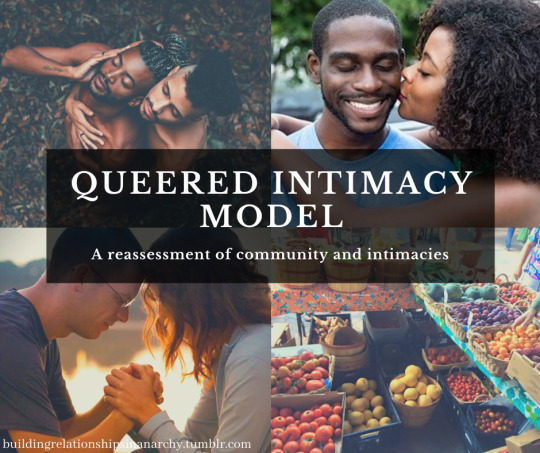
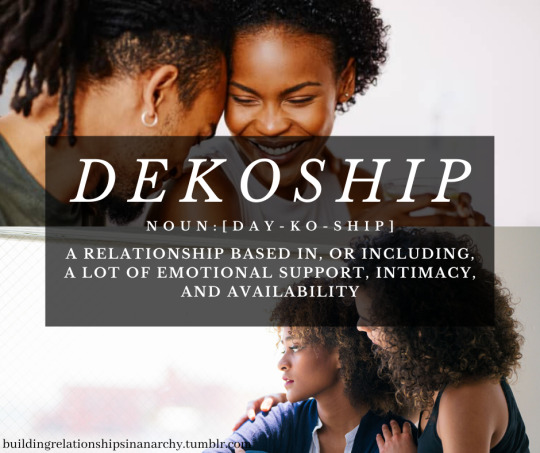
What is intimacy? It’s closeness right? To be near some ‘intimate’ part of another person, or them near something meaningful about why you’re you. I wanted to start this series by talking about what it means to be close to someone. If you remember my birthday without Facebook, that might make me feel a bit special. But if you remember how badly I was abused by an old friend, its because I trusted you enough to share some of the sadness that I’m not as loud about.
Intimacy isn’t always trauma, sometimes its tears of joy hearing that your cousin is out of prison, or the laughter of your friends. Being close to each other in a hyper-digitized age is a bit tricky, but phone calls, facetime, snapchat are only some of the tools we use to keep each other updating on what we’re feeling. Whether its about our love life, sex life, work life, or home life, just sharing that information can be real special, and bonding.
When we say that we have friends or that we are [Queer] Platonic Partners, does that mean we’ve decided how often we’re gonna talk or what we’re gonna talk about? What if we just send each other memes or rant about politics? Am I supposed to devalue those interactions because they aren’t the person I’m crying on the phone with?
Intimacy can be as deep as childhood scars and as simple as surprising me with my favorite snack. It all just means you know who I am, what I like, and what I care about. I want to intentionally forge those connections. And this why I set these definitions first.

Other Words:
A Daekkon (n.) would be person/partner whom you’ve developed intentionally this kind of relationship with.
If you desired this kind of relationship with a certain person, you’d be feeling Daekeen (adj.) for/about that person.
People who are desiring or actively doing these activities together are Daekkoning (v.).
This would be understood as Daekkonic (adj.) behavior; as in, “My roomate isn’t super talkative with me, but is deakkonic (adj.) with Sandra from the Mosque.”
“Tom is going through it, he’s felt deakkonically (adv.) deprived since the move.”
________________________________________________________________
In our sex-negative, ironically repressed culture, we seem to think that if you’re touching your bodies together at all, it means *something*. I want to remove that idea. I want to reclaim physical affection. I want to be touch and be touched by others. I don’t want my afab friends who have experienced some sort of sexual violence in their lives, to ever feel weary about the fact that I’m physically affectionate. It’s been my #1 Love Language for the last 10 years.
Fighting r*pe culture is a full-time fight, but I think adding a word, and therefore an idea[l], can be useful in reclaiming safety, and boundaries regarding bodily autonomy, for all of us. Clear communication and respected boundaries and asking consent for everything are the bedrock we need to continually practice. And as trust builds, I believe this could be very useful theoretically tool for improving the quality of our relationships and help create clearer discussion about our individual boundaries, needs, and desires.
I feel like this leads me to a relevant question. What activities are inherently platonic, romantic or sexual? Is holding hands inherently romantic when almost all of us have done it with a friend? What about those of us who are religious or spiritual and have held hands with members of church, mosque or synagogue; do you think we’re out here non-stop blushing at the Pastor? Or when we held hands with family members? Doesn’t sound like it holds up, huh?
What about snuggling a roommate? Holding a teammate while celebrating a victory? The kiss my bestfriend gave me on our shared birthday dinner? Are we left to through our Aro and Ace friends’ out of the discussion, just because our culture has bad takes on sex and romance as the only forms possible of significant physical touch? Physical touch is such an important way to communicate love and affection, as well as care, concern, and comfort. They don’t get to cast their shadow on this space anymore!
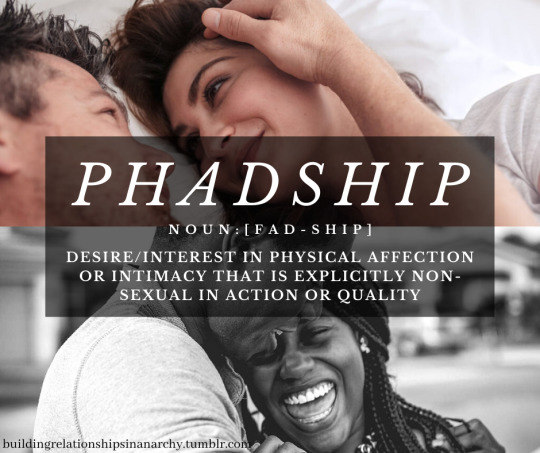

Other Words:
If you had this desire for someone, or wanted to approach cultivating these forms of affection in a relationship, you could say you’re feeling Phaddish (adj.) for that person.
.Participating or initiating acts of a non-sexual physical intimacy Phadronic (adj.) quality are said to be phade-ing/phading (v.).
A Phadrone (n.) could be the name of a person/partner you share this kind of relationship with.
Phadroning (v.) would the act of cultivating this kind of intimacy with another person.
Phadronically (adv.) could describe a certain level of intimacy implicit in a physical touch between to particular people.
________________________________________________________________
Now lets talk about Sex. That’s the thing the everyone’s mind always gravitates to when discuss words like, intimacy, attraction, desire. It’s the thing we want to stay away from when you use the Platonic or Friendly. But, lets be real. Haven’t many of us had sex with people didn’t even consider friends? Or people who became our “Strictly Platonic” friends after we may have had sex, once or several times, with them?
People who gravitate toward polyamory or non-monogamy tend have had a “hoe-phase.” The boundary between friend and lover, or partner and fuckbuddy have been blurred in a good chunk of people’s lives. Non-monogamous or not, I think it’s useful to talk directly about our sexual experiences, desires, fantasies, and how different it can be with different people, or in different stages of our lives. But what makes an experience sexual? Maybe that sounds redundant or obvious; I mean, it’s got the word SEX in it, maybe that’s got something to do with it? But maybe not...
Lets ask an odd question. Is sex inherently sexual? Who wouldn’t assume the answer is automatically yes? Well, my first thought is to talk to those in the Adult Entertainment industry or friends of ours who are sex-workers, in whatever capacity. Is every client sexy or shoot erotic? Those of us who have sex, have we never been doing it and been bored through most of at least one experience?
If sex is inherently sexual, why do we have so many Sexual Health Educators, Marriage Counselors, Pornstars, Yoga Teachers, Personal trainers and Writers telling us how to have sexy sex? Dating Coaches and Websites, telling us how we are getting something that’s supposed to sound so easy wrong.
I’ve come to the opinion that sex isn’t about body parts, genitalia, certain body motions, or even clothing [or lack thereof]. I believe that sex, or eroticism, is all about the context and the people involved. There’s nothing inherently sexy about fruit, or food in general, but if woman eats a banana in public, there are at least several men in area thinking of something than her healthy food choices.
This is why talking about sex directly is good. And understanding it as an energy that you imbue to any activity or circumstance, could help have better sex; and and on the flip-side, show us how we may need to more aware of how we may take up space with our body language. I do also feel, that in part, some of our Ace friends (those who aren’t sex repulsed), may be able to find some resonance with this model; sex doesn’t have to feel passionate or any particular way at all (other than good?), because sex isn’t about sexiness, but about human connection and pleasure.


Other Words:
Serotic (adj.) activities include any activity that is engaged due to, or is infused with, sexual desire and/or erotic intention. It also describes the type of desire you’re feeling for another person.
A Serato (n.) is any person you engage in serotic activities or feelings with.
An activity that was originally un-serotic (adj.), but became sexually or erotically charged, we could described as having become Serotically (adv.) charged.
When you are cultivating or charging an act with serotic energy, you are Seroticizing (v.) that activity
________________________________________________________________
Lately, especially since diving into Radical Politics, I find less and less desire in defining Who I Am as a part of a relationship unit. It’s an overlay from monogamy, The Couple being the only social unit that is recognized, as it’s necessary to the Nuclear Family; a super important thing for Capitalism to sustain itself. The relationships I cultivate with others, with whatever forms of intimacy or interactions therein, cant be understood by that model. I am more than my interactions with a handful of people; I am a human person, and my engagement with the world isn’t actually reducible to whether or not I’m having sex with someone or not.
We’ve talked about multiple forms of intimacy, and some of the desires or interests associated with them. Have you noticed that in the desire, or need, to discuss relationships on a basis of, ‘sex: yes or no?’, that we haven’t talked about the webs that form because we are all reliant on each other to survive? Not everyone in your community or workplace or online spaces, you’ll get to know or talk to. Do they, as people, matter less because they aren’t in your contacts list or your DM’s?
This is a space where not a lot of us to tend think or engage as much. An easy word to discuss this space is community. But is a community the people or the place you spend your time, whether online or off? Is the community the place you live and your neighbors? Is it the people who may share some of your identifiers or face similar forms of oppression, despite living in a different city, state, country?
We are multi-dimensional beings, and with the use of technology, there are so many ways to form relationships, and share resources. I think the ‘community’ is any space you find yourself in, which means that mutual aid is something you are always able to engage in. Whether it’s feeding the homeless guys who hang out by the intersection, or dropping a few bucks in a trans kid’s venmo, mutual aid is so much easier.
But what if that feels so inconsequential? It’s not! But it does, from time to time, feel like the problems of the world are so big, and that you and so many you know are suffering in ways you wish you could help. Well, community organizing is always happening somewhere, online and off. It becomes important to join up with others in order feel like we can actually make a positive impact on the lives of others. We don’t have to wait on a government who’s interest isn’t ours, don’t have to wait for some politician to fail on a promise to Make Things Better.
We have each other, and we are all we really have. At the end of the day, all of our concepts are man-made. COVID-19 showed us how drastically things could be different if the people in power made decisions that actually benefited us. A lot of us understand the need to do something. Capitalism says that competition is what drove human kind into evolution, the fight for survival in a meaningless, terrifying world. Anarchism, as I’m learning, throws the whole idea in the trash where it belongs.
Peter Kropotkin, whose been called both the Godfather and Santa Claus of Anarchism, penned in Mutual Aid: A Factor of Evolution (1902), “under any circumstances sociability is the greatest advantage in the struggle for life.”
We are better off together. Capitalism and the property relationships in our compulsively monogamous society try to tell us other wise. We don’t have to follow that model.
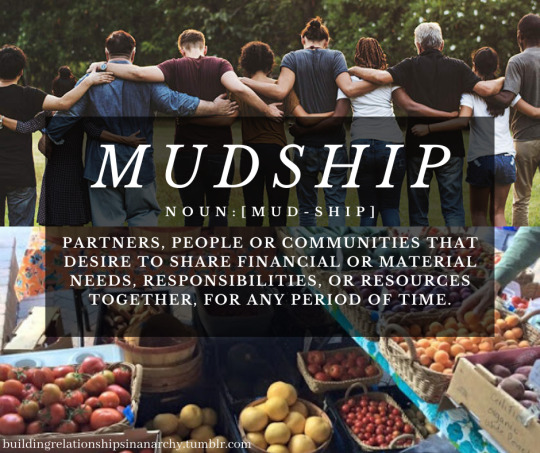
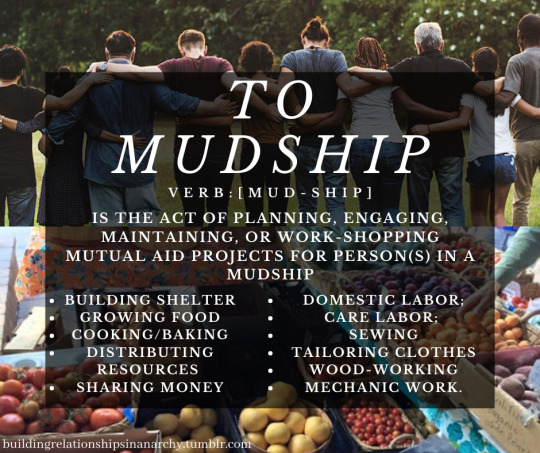
Other Words:
To Mudshop (v.) is to build a mudship with a particular person, organinzation, or community; Mud-shopping (v.).
A Mudshipper (n.) is an individual in a mudship of any scale.
I’ve said a lot. I hope this reads as accessible to as many people as it can be. I built this because I want to tell the people in my life why I love them as dearly as I do. And that I’d love to build relationships with as many awesome, lovely people as I can.
If you try to use the words Romantic and Platonic while you look at this post, and find it almost impossible, I’ve done my job.
I hope those words die along with oppressive ideas they uphold.
#relationship anarchy#polyamory#solo poly#intimacy#love#relationships#relationship dynamics#alternative relationships#communism#marxism#collectivism#Anarchist#anarchy#anarchism#aromantic#aromantism#aromance#asexual#asexuality#ace#aro#QIM#queered intimacy model
427 notes
·
View notes
Text
A young American woman's thoughts on 9/11 and the current state of the union:
I won't pretend I know or understand every detail of the attacks, or how my country has changed so drastically since then. But I do know what I saw, I know what I felt, and I know how it's affected me these past 18 years.
September 1, 2001: I was 6 years old, heading to my first grade classroom. I rode the bus back then, and usually zoned out until I could get somewhere to read or draw in peace. I don't remember stopping to get breakfast in the cafeteria, but I do remember heading to the classroom. I remember walking in to see my teacher staring in horror at the tv screen. My classmates and I were confused — "Mrs. Hicks, why are you crying?" "Mrs. Hicks, why are we watching the news?" "Can we change it to a cooler channel?". We didn't know any better.
Then we saw the second plane hit the tower.
I don't remember much about what happened after that — maybe the day passed in a daze, maybe we got sent home early for our safety (we're only about a half-hour away from Hartsfield-Jackson airport, and I know now that many people were worried we might be next). All I know is I remember being at home later, watching the news (and complaining about the news) with my parents, and eventually watching Mr. Rogers discuss the matter in a short tv message (not this one, but kinda close).
Things changed more than some people seem to know, for those of us too small and too young to understand much anything else.
My kindergarten and first grade classes, up until then, had never enforced the reciting of the pledge, and had never held a moment of silence before. Now the moment was compulsive, almost harshly enforced by many teachers, and if we didn't stand and recite the pledge, we sometimes had to stay standing until we did recite it. They threw the numbers in our faces — 3000 lives, countless unfound bodies, families broken apart — and expected us not to understand, I know now, but to fall in line anyway.
Far too many people took this event — one that was said to have brought our nation so close together — and used it to force complacency into our veins. I had classmates who lost loved ones to the attack — either working in the buildings, or helping the rescue effort. They were the first to fall silent. Then came those of us who simply couldnt comprehend the tragedy; we just didn't want to get in trouble, and just did what was asked anyway.
At that age, there were very few who fought back, even in the older classes. Those who did just wanted answers: why do we have to pledge our allegiance to a flag when it's humans who are fighting and suffering? How does a moment of no one talking show respect when we don't know what really happened? What happens to our country if we go to war over this? No one had any answers, and some teachers got so frustrated that they would simply get on to the kid and move on instead of addressing their concerns.
Then our soldiers flew to the Middle East, and we've lost so many more lives (and countless innocent civilians on the other side) than we ever did on that day. And look at how everything has changed.
Now, I'm almost 25, and look out to a world that frightens me so much more than the memory of collapsing towers and deadly debris. Our soldiers are considered infallible, looked to out of near-hero worship levels of admiration. We spend more money on defense and security in this country than multiple others combined. People protest things like police brutality during the pledge, and instead of discussing the actual issue, they discuss whether or not it was "disrespectful to veterans", without ever asking actual veterans. (Yes, racism was the biggest part of why the issue was ignored, but that doesn't change the fact that many people hold the pledge and the flag to a standard that rivals those of false idol gods). Students — kids, fucking kids — are shot in their schools, and people won't work to protect them because they're still so afraid of being unable to "protect" themselves.
Nazis walk in the streets, claiming they're being attacked, while all they preach is hate and violence. We once agreed we hated Nazis, that they were gone, but they never left. They just helped build this environment for them to thrive.
Veterans are living at a high rate of homelessness and unemployment, while people declare our soldiers and this fight to be more important than anything else. Some of these veterans say the war is wrong, and are scorned for it.
Black children are warned their entire lives never to trust a cop, but people think it's outrageous that cops should deescalate situations without using violence. A black boy gets shot in his backyard, and no one cries for him because no one hears about it.
A white man shoots up a synagogue, or a black church, or a mosque, and people will cry "mental illness" and "this isn't the time for gun control talks". Those who cry "terrorist" are swiftly silenced.
People are being torn from their families and shoved into small holding pens, like animals lined up for slaughter. Conditions are horrific. People have died. People are still dying.
And I walk into a classroom today, for work, and see the teacher discussing 9/11 using a video — a song — that asks people why they would disagree with the fight unless they'd forgotten the attack on our soil.
People like myself have to be sneaky now, when and where we criticize our home. I only feel safe to do so here, where the only people that know me IRL either agree with me on some level or don't follow my blog at all. I don't even feel safe to discuss these with my parents, even though I know they feel the same, because I won't ever be able to get them to understand my perspective; they're too easily blinded by their own.
I can't say that I'll never understand how we got here, from where we were. I can hope we never go through such an event again, though that hope is fading fast the longer I stay in this reality. I know too well now how the world has changed, how my world has changed. Mr. Rogers' words only do so much for me now, serving only to remind me how far we've fallen and how little I've done in my years of growing up to fight against it. And I know it's not my fault that I haven't done much — there's only so much a child with no means of doing anything or going anywhere on their own can do, and very little a child of left-leaning parents in a right-wing community can say without something going very wrong — but that doesn't change how I feel.
And I want to do more, now. I look back on that day, now, and can feel the hurt and pain so many did then at the loss of so much life, but also the fear and heartbreak at how many more lives have been ruined and destroyed in the years the followed. And I want to help make it right.
Mr. Rogers said he was proud of us. I want him to be right.
#me#personal#9/11#9/11 attacks#if this resonated with you feel free to reblog#mr rogers mention#on mobile — dont know how to do read more
17 notes
·
View notes
Text
Sri Lanka, Paris
Passover and Easter are unrelated festivals that derive from different traditions, but that’s not how it seems to many in the Christian world. That most of the world calls Easter by a name related to Pesach (cf. French “Pâques” or Danish “Påske”) is part of it. As surely also is the assumption, widely believed yet almost definitely not historically correct, that the Last Supper described in the Gospels was a Passover seder or some version of a seder. (For an exhaustive consideration of every aspect of that issue, which apparently remains a delicate one even today in some circles, click here.) Even the use of the word “passion” to describe the suffering of Jesus provided some fuel for this particular fire, at least in antiquity, since the Greek word for “to suffer,” pascho, is phonically almost identical to Pascha, the name for Passover in the spoken Aramaic of ancient Jewish times.
Given the proximity of the festivals this year and in light of the above, I would like to write this week specifically about two events that have befallen the Christian world just recently and explain how they appear to someone reading the news through Jewish eyeglasses.
First, Sri Lanka. The numbers keep rising. First, “more than 100” dead, then “more than 200,” now, as I write on Wednesday, a minimal figure of 321—minimal in the sense that many of those hurt in the explosions—more than 500 in their own right—are not expected to survive and only haven’t succumbed to their wounds yet. It’s far away. It’s not a country Americans think of daily. No one on the radio, including the BBC World Service, seems to know whether the first word in the country’s name is pronounced “shree,” or “sree.” (In all fairness to the Brits, when they seized the place and unilaterally made it part of their empire, they called it Ceylon, which name everybody knew how to pronounce.) And yet…the sense of familiarity and shared humanity that incidents like this bring in their terrible wake seemed to overwhelm the rest of the details. Most Americans, I’m sure, couldn’t even say easily what language they speak in Sri Lanka or what the capital city is, let alone whether a majority of the citizens are Buddhist, Hindu, or something else entirely. Indeed, it felt at first like a terribly bad thing that had happened to other people. But then, just as the extent of the carnage was becoming known came the even more startling detail that the attacks on the three churches and four hotels were apparently planned as a kind of response to the assault on the two mosques in Christchurch, New Zealand, in the course of which fifty Muslim worshipers were murdered. And with that single detail everything changed.
The single ideational concept that justifies terrorism in the mind of the terrorist is the ultimate fungibility of human life. Since I’ve been dealing in SAT words these last few weeks, I’ll add another: fungibility is the principle according to which things are deemed solely to have ascribed, not intrinsic, value. Paper money is the easiest example to seize: if I lend you five dollars on Monday and you come back on Tuesday to return the five dollars to me, I can’t sue you in court because the five-dollar bill you returned to me is not the same five-dollar bill I lent to you. But this is not so because it would make no sense to borrow money you were not planning to spend. It’s true because money in our culture is deemed fully fungible and, as a result, the paper bills we use as currency are supposed to have as their sole value the sum they represent, the sum ascribed to them by law. As a result every single five-dollar bill is deemed the equivalent of every other one and you can’t complain if you deposit a fiver in the bank one day and then receive a different bill from the bank the next day when you show up to withdraw your money.
This principle also applies to the eggs you borrow from a neighbor or the cup of sugar, but ethical people would never apply it to human life. To justify terror, however, is to do exactly that and willingly to ignore the fact that none of those people in church on Easter morning in Sri Lanka was responsible for the massacre in New Zealand and thus to feel justified in opening fire because you consider Christians to be as fungible as five-dollar bills and the shooter in Christchurch was presumed at least in some sense to have been a Christian. And that underlying notion makes it a humanitarian issue, not a Sri Lankan one or even a Christian one. This perverse line of logic is not unknown to Americans and it is certainly not unknown to Israelis: when someone is irritated by some or another Israeli policy and chooses to express that pique by blowing up a discotheque despite the fact that none of the young people on the dance floor was responsible for the policy in question—that too is an example of treating human life fungibly.
As a result, attempting to wave away events like this weekend’s horror in Sri Lanka as nothing more than the violent crime of an insane person is to miss the point: if the government is right to consider credible the statement by the Islamic State’s Amaq News Agency tying the Sri Lankan bombings to the shooting in Christchurch, then the principled effort to eradicate terrorist groups and to banish their nation-state sponsors from the forum of nations is not only a practical response, but a deeply moral one. There are, of course, crazy people in the world who do crazy things. We Americans have had lots of examples of that in these last several decades! But terror is not craziness at all: by resting on the ideational foundation that considers all human life truly to be fungible and thus devoid of intrinsic value, terrorism comes to represent the ultimate devaluation of God’s greatest gift. As we approach the end of Passover and prepare to commemorate the destruction of Pharaoh’s armies in the sea, we should all take a moment to reflect on a deep, if unsettling, scriptural truth: violence undertaken to dominate or to oppress is wrong and fully sinful, but acting forcefully to combat evil is both ethically justifiable and, speaking morally, wholly right. Americans know this. Israelis certainly know it and so do New Zealanders. And now Sri Lankans have had the same lesson brutally brought to their own doorstep.
I brought a whole different set of emotions to my contemplation of the fire that destroyed such a significant part of the Notre Dame cathedral in Paris. It is, arguably, one of the most stunning pieces of Gothic architecture in the world and is surely one of the world’s truly great cathedrals. It took a hundred years to build. (Work was undertaken in 1160, but the project only drew to its conclusion a full century later in 1260.) There’s no reason for that specific detail to confound—work on St. John the Divine on Amsterdam Avenue began in 1892 and the project still isn’t anywhere near finished—yet it somehow feels challenging nevertheless to think of a project spanning that much time and involving that many people. And all of it happening so long ago, and in an age without power tools, bulldozers, or electricity! For Jewish onlookers, on the other hand, the cathedral shimmers in a slightly different light.
For the Jews of France, the twelfth century was a terrible time. When work on the cathedral was still in its third decade, King Philip II expelled the Jews of France from his territory, apparently without the slightest interest in knowing or caring where they went once they left. When work on the cathedral was about halfway done, a council convened by Pope Innocent III—called the Third Lateran Council because it met at Rome’s Lateran Palace—disqualified Jews across Europe from holding public office, required Jews (and Muslims too) to wear distinctive dress so that they could not be mistaken in the street for Christians, and banned Jews from almost every profitable profession except pawnbroking and the sale of old clothes. But it wasn’t solely their economic lives that were under attack, but their intellectual lives as well: on March 3, 1240, when Notre Dame was a mere twenty years away from completion, church officials burst into synagogues across France—March 3 was a Shabbat in 1240—and carted off entire Jewish libraries. Eventually the king of France, Louis IX—who is recognized as a saint both in the Roman Catholic and Anglican churches, and who is the St. Louis after whom the city in Missouri is named—insisted that the Talmud itself be put on trial. The ancient work was defended by a quartet of able rabbis, but the verdict was a foregone conclusion and then, on a day that lives on in infamy as one of the pre-Shoah world’s most outrageous acts of violent anti-Semitism, twenty-four cartloads of books—some 10,000 volumes, including irreplaceable works that would be considered of inestimable value today—all twenty-four cartloads of books were burnt in public on the Place de Grève, now called the Place de l’Hôtel de Ville, just across the river from…Notre Dame de Paris.
Notre Dame itself features one of the most hateful of all anti-Semitic symbols on its front façade, where are depicted Synagoga and Ecclesia (“Church”) as a pair of very different women, the one (Synagoga, of course) dressed in rags, a snake covering her eyes, a broken scepter in her hand, and the tablets of the law slipping from her grasp, and the other, Ecclesia, depicted as a proud, attractive woman standing fully erect while carrying a wine chalice in one hand and a staff with a cross at its top in the other. The insult couldn’t be more clearly put. Nor has it lost its punch over the centuries: even though the statues were destroyed during the Revolution, they were both were restored and replaced during the nineteenth century. They’re still there too, inviting any eagle-eyed visitor to learn the lesson they were set in place to teach: that Judaism is defunct, dead, and disgraced, whereas Christianity is triumphantly and gloriously dominant.
So when I look at Notre Dame and feel the same pang of regret all civilized people surely do when a world-class work of architecture is damaged, I also recall the world that gave birth to Notre Dame and its harshness, its cruelty, its violence and its deeply engrained prejudice against Jews and against Judaism. And I think of poor Synagoga as well, and wonder what she would have to say if she were somehow able to shove the serpent aside and open her stony eyes onto the world. Would the fact that she’s still on display all these centuries later surprise her? And what would she have to say to the thirteen million visitors who walk by her on their way into France’s most famous cathedral? Would the resurgence of anti-Semitism in France surprise her? Would the existence of an independent Israel? Would anything? Those are the questions that the fire at Notre Dame prompts me to ponder on these coming final days of Pesach.
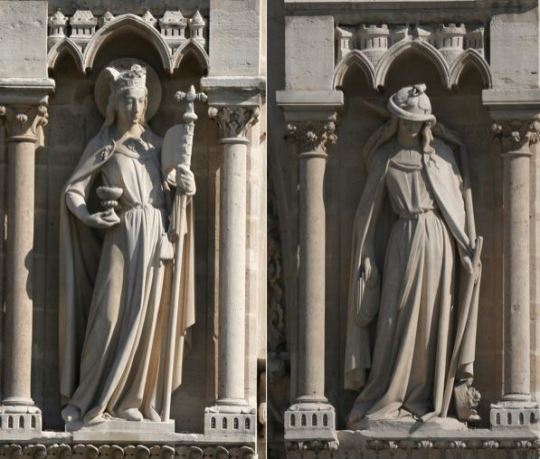
70 notes
·
View notes
Text
so... i’ve mentioned before a couple of times that i’m slowly (very, very, very slowly) working on my own original stories. and... well, the cast is pretty diverse (which makes sense, since i want to be a diverse fantasy author, duh). since i am but one person, i haven’t lived all of their experiences, and i’d love it if anyone had tips? hell, even for the experiences i have lived; i’m not turning down any advice.
anyway, here are the main characters:
Lev Abulafia– 15; half-Ashkenazi, half-Sephardi; raised in a fairly secular household (mom wears a tichel because she wants to, not because she’s super orthodox; they only really go to the local synagogue for Rosh Hashanah; etc.); autistic; has a crush on Aabir; lives with his mom and sometimes with the Wen family, who’ve essentially been actual family since before Lev was born
Meiling Wen– 15; at least half-Chinese (only met her dad); Lev’s sister and best friend; has known she was a girl since she was two; mentally ill (haven’t quite decided on a diagnosis yet, for multiple reasons, but psychosis is involved); celebrates the Jewish holidays but is uncomfortable calling herself Jewish; pretty nice but also lowkey loves sassing her siblings
Xiuying Wen– 22; half-Chinese (shares a dad with Meiling); Olympic gymnast and martial artist; diagnosed with ASPD at age 19; is the only person allowed to call Meiling “Mei” (because Meiling was afraid to ask her not to when she was younger and now she’s just used to it); likes partying and booze; stopped doing anything beyond weed at 21; pansexual and polyamorous; not super reliable but relatively self-aware; unlike Meiling, she does consider herself Jewish, since she was raised with Jewish holidays and culture as a major part of her life, even though she isn’t religiously or ethnically Jewish
Aabir ibn Isaiah al-Hashimi– 15; father is Sunni and mother is Shia (may change this bc I definitely don’t want to start anything and I’m not super educated on Sunni-Shia relations yet); has an older sister; bisexual; best friends with Thomas, even though no one can figure out why; believes that there is good in everyone, which leads to him trying to help people he sees “going down the wrong path” (like Thomas); plays basketball
Sandhya Ghatak– 16; born in Tripura, India and moved to the States at age 5 because her doctor was moving; has four arms (hence why her parents moved with her doctor); speaks Bengali, Hindi, English, and a little bit of Kokborok; closeted lesbian; dating Alex; fire powers (have to learn more about Hinduism and Agni before I go into more detail about that tbh); really loves makeup but is also very aware of where she buys it from, and is very, very clear about why she wears it (for herself, no one else); student council vice-president; straight-A student; very popular and probably the prettiest girl in the school; high anxiety and probably some other mental illness but I haven’t decided what yet
Alex(a) Howe– 16; closeted trans lesbian; was raised by super liberal parents and is hyper aware of his privileges; only out to Sandhya, so mostly uses he/him pronouns; doesn’t have a transphobic family but is choosing to remain closeted because he wants to be a professional football player; doesn’t like spicy food but is trying to increase his tolerance to impress Sandhya’s parents; had trouble saying Sandhya’s name at first so he practiced over and over again until he got it right; doesn’t use makeup himself but is pretty knowledgeable about it bc of how much his girlfriend likes it; pretty intimidating at first sight but honestly a giant teddy bear; learning Bengali; became friends with Sandhya in kindergarten and started dating her in high school
Jess Cooper– 15; nonbinary black teen; lives with their father and younger brothers; older half-‘sister’ went missing seven years ago; spends a lot of time working with their pastor helping out charities; PTSD from the death of their mother and SPD (Schizoid Personality Disorder - a “secret schizoid”); befriends Thomas after he learns why Aabir befriended him and tries to help him become a better person; doesn’t bind bc they can’t afford a binder; works two part-time jobs to help pay for younger brother’s medical expenses; sexuality currently undecided (I was going to have them be asexual, but I want to make sure I’m not stereotyping people with SPD before I finalize their sexuality)
Thomas Weaver– 15; lives with his abusive dad and younger half-sister Sarah; cis, white, poor, straight, Catholic, and super bigoted; only friend is Aabir; starts off as antagonistic until he overhears Aabir telling Lev and Meiling that he only befriended Thomas because he realized that Thomas fit the profile of a potential school shooter; becomes depressed and lashes out until Jess confronts him and he breaks down in front of them; character arc revolves around unlearning toxic behaviors, accepting others, and open-mindedness; develops a crush on Jess which leads to internal conflict when he realizes he sees them as a girl and therefore hasn’t come as far as he’d first thought
Sarah García Weaver– 6; Thomas’s younger half-sister; has lived with Thomas and his dad for since she was 3 when her parents died in a car accident; half-Mexican on her father’s side; often used by father and brother as “I can’t be racist” playing card; too young to really understand much; likes cars but plays with dolls bc her stepdad thinks cars are for boys only; wants to be a train conductor when she grows up
Riley Cooper– 21; Jess’s older half-brother who ended up in another dimension when he went to what was supposed to be a meeting for closeted trans teens; left before either he or Jess came out, so both referred to the other as “my sister” until they met up again; mother was a white woman from a racist family who got disowned for dating a black man and was hit by a car during a panic attack when Riley was 4; considered Jess’s mom to be like a second mother and was heartbroken to learn she’d died while he was gone; bisexual; ends up in a relationship with Xiuying and Luca; transitioned via magic while missing and worked as a soldier so he kinda looks like he can bench-press a tank
Luca Finley– 21; half-Romani, half-Native Hawaiian; was raised by Roma mother after other mom (I think the word is ‘Māhū’?) was killed in a hate crime; wants to learn about Shaktism but doesn’t have the resources to do so; bisexual; works as a bartender in a club Xiuying likes to go to; ends up in an open relationship with Xiuying, which Riley eventually becomes part of
there are other characters as well (Mr. Wen, Ms. Abulafia, Joe Weaver, Mr. Cooper, Pastor Kim, Pastor Kim’s wife, etc., but these guys are the main characters + Sarah - I’d put Jess’s younger brothers here too, but... this is already a lot of words, and also Marcus and Antoin are both walking spoilers)
#writing help#my ocs#lev abulafia#meiling wen#xiuying wen#aabir ibn isaiah al-hashimi#sandhya ghatak#alex howe#jess cooper#thomas weaver#sarah garcía weaver#riley cooper#luca finley#joe weaver#marcus cooper#antoin cooper#pastor kim#any help or advice would be fantastic!
12 notes
·
View notes
Text
April 27, 2019
Stunned. Thats it. Stunned.
Today is the last day of Passover 2019. I began the day feeling good because this was going to be the end of the first Passover that I observed. I had stuck it out! 8 days without chametz! But when I got to work I heard about the shooting at the Chabad of Poway Synagogue near San Diego. It was like a punch to the gut. I was shocked and quickly read several articles trying to get the latest information about the shooting. But it hit me-- the terror, the fear that it could’ve been me.
i am currently in New York, but i am moving back to Southern California in a few months and have previously lived there for the last two and a half years. I am now pursuing conversion and the feeling that it could’ve been me or one of my friends or their family members brought me to tears.
I’ve been thinking a lot recently about how I am still very shy about being upfront about the fact that I’m converting with friends and family. I haven’t felt Jewish, like I could confidently say I am Jewish to others because of how much I still have to learn. But today, the shock, fear, and sadness that came over me and that feeling like a pit in my stomach is signaling to me that this is it. This is the first time I am feeling like a part of the Jewish community and it is all coming about under the worst circumstances. This is not the way I thought it would happen, but it is an overwhelming and powerful feeling. Its amazing and alarming and wonderful and awful all at once. My heart is so heavy but I feel a strong sense of connection to my Jewish friends. I love them so much and couldn’t bear to think about what I would do if something like what occurred in Poway or Pittsburgh happened to them.
I am a woman, a woman of color-- a Latina woman. I look young for my age and my appearance isn’t intimidating or one that lines up with authority figures as society knows them. I have experienced racism and discrimination in many forms in my life so far. But discrimination for my religious beliefs was never one of them. I am feeling the weight of that today for the first time and really coming to terms with the fact that someone could kill another person because they do not approve of the other’s religious beliefs. It is a very unsettling feeling. But feeling this way now makes it that much more important for me to go through with this conversion. It’s important for me to be jewish and be jewish out loud.
Yesterday I was debating on how I would handle the last day[s] of Passover. Do I go the Israeli or diasporic route? 7 or 8 days? (Cause I really wanted bread back in my life!)
I decided to do the full 8 days. And today with what has happened and how I am feeling about this awful anti-semitic act, i am so happy that I waited and followed this tradition as I end my first Passover; it seems like such a small detail, but means so much to me and more so now with today’s events. It’s 6:20pm ET as I write these last sentences right now. These events-- both waiting 8 days to eat bread again and the shooting at Poway-- will be with me forever as they are marking this first Jewish holiday that I observe. My heart is heavy, but it is also full as I stand by my new community today. Jewishly.
7 notes
·
View notes
Text
Days 146-147: Salt, Cemeteries, and Castles (Krakow, Part II)
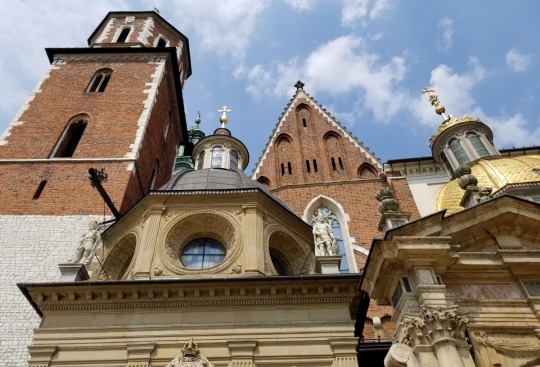
Our last day and a half in Krakow was (mostly) much more pleasant and lighthearted than our morning in Auschwitz. We saw amazing salt sculptures, a magnificent castle, and--yes--a sobering cemetery.
Our morning Auschwitz tour included an afternoon tour of the famous Wieliczka salt mines near Krakow. We were dropped off in Krakow with an hour or so for lunch, so we headed over to a nearby Costa Coffee to recover.
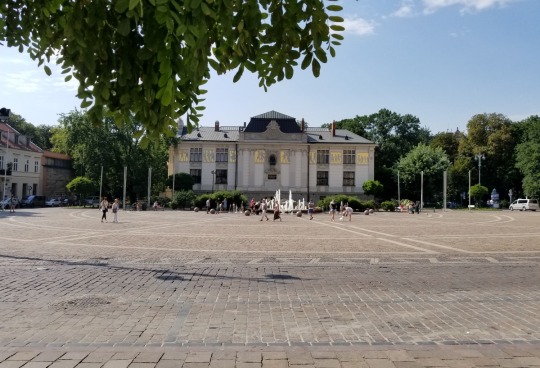
The Costas in Krakow are an interesting departure from the ones in the UK. The comfortably generic coffeehouse décor is the same, but the food is fresh and local--unlike the somewhat mass-produced-feeling fare in the UK. We each had a ham, cheese, and tomato sandwich (fresh-made, not packaged) with blessedly cool iced coffees. I also sprang for a slice of “forest fruit” tart with raspberry, blackcurrant, redcurrant, and apricot. An unusual combination, but very tasty.
Stepping reluctantly out into the summer heat, we made our way back to the tour office and joined up with our group bound for the salt mines.
The trip out of town was a bit hectic. There was a bike race going on, and one of the streets cutting across central Krakow had been shut down. Our driver hadn't known, and we ended up stuck in a one-way side street with our bumper to the crowd-control tape. After calling back and forth with home base, our driver decided to just park the van and wait for ten minutes or so until the racers passed. He opened the van and several people hopped out to join the sidewalk spectators.
Jessica and I stayed inside the air-conditioned van. The exhausted part of me that was still reeling from the morning's trip to Auschwitz secretly hoped that the trip would be cancelled and we could head home for an early evening. But thankfully that didn't happen. It was a long, tiring excursion, but we both had a good time and saw some impressive engineering and incredible blue-collar artwork.
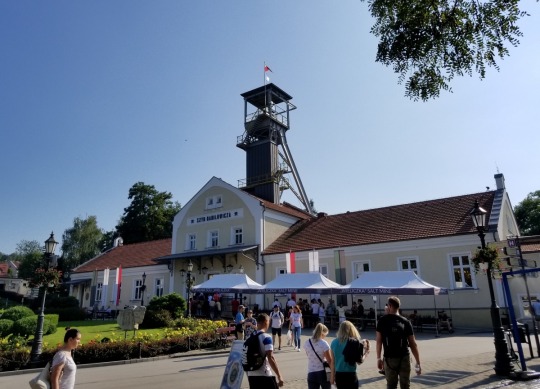
Tours into the mines had to be strictly timed for crowd control, so we had a few minutes to use the bathroom and chug some water. A misting station had been set up to help people stay cool.
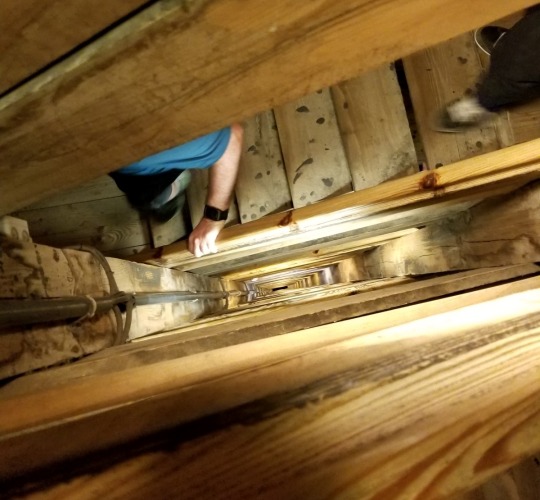
Finally, it was time to enter. We took the stairs, and they seemed to go down forever. When we finally stopped descending, we were 64 meters--almost 20 stories--underground.
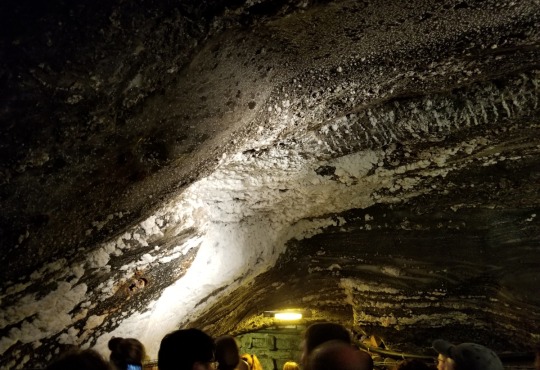
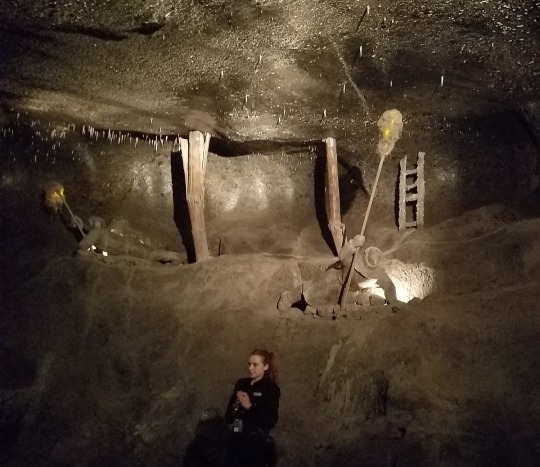

A huge source of wealth for the country since the Middle Ages, the salt mines are a source of national pride in Poland. The mirror-smooth, crystalline caves made of 90% pure salt are beautiful and fascinating, as are the surviving wooden cranes and other bits of old mining technology. But the obvious focus of the tour is the art.



For the past hundred years or so, the salt miners occupied their free time by carving strikingly intricate and well-realized statues. There are statues of contemporary folks, historical heroes, and religious icons. Looking at the distinctive style of the statues, I can’t help but think that the art designers for the Lord of the Rings movies could have taken heavy inspiration from these statues when designing the aesthetic of the dwarven art and architecture.
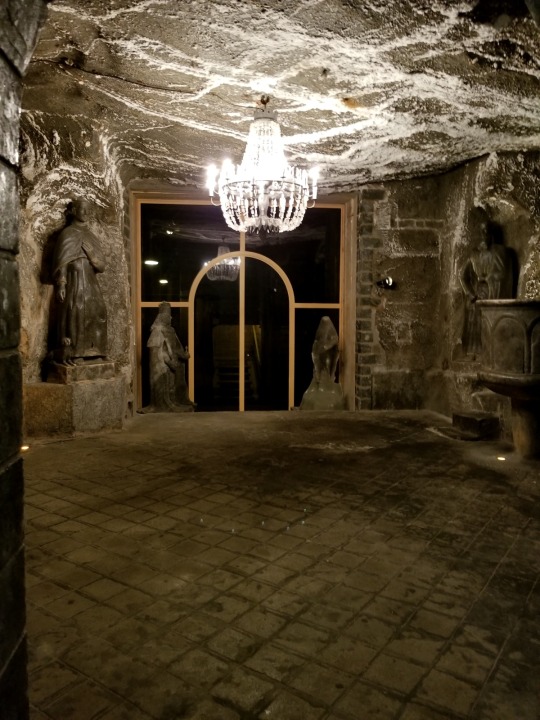
There are also a healthy handful of chapels. Like the Welsh slate miners, the Polish salt miners were intensely religious and God-fearing. But rather than make do with cramming as much church as possible into their off-days, the Polish salt miners filled the mines with churches that they could use every day.
And of course, everything from the ceiling to the floor was carved from the salt.

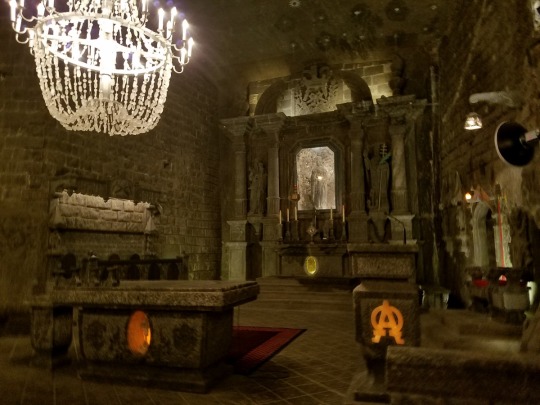
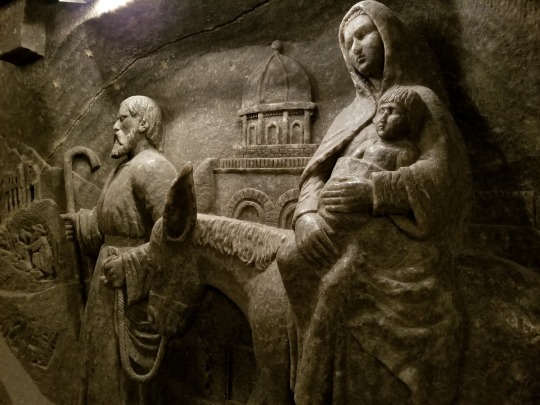
The crown jewel of the tour is the jaw-dropping St. Kinga Chapel, whose expansive walls are lined with remarkable recreations of iconic Christian art.


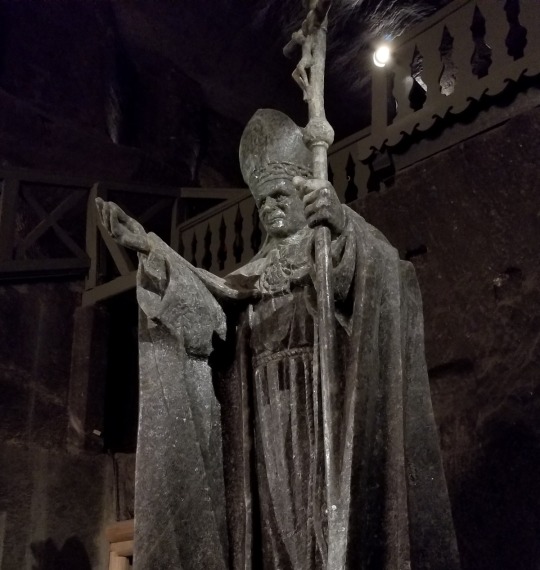
And, of course, the centerpiece within the chapel collection is a strikingly lifelike statue of the late Pope John Paul II. I haven't mentioned it yet, but Cracovians are absolutely nuts about their homeboy John Paul. To be fair, though, the adoration was pretty well earned. After so many centuries of being seen as a second-rate nation by the rest of Europe, for this deeply Catholic country to finally have a pope chosen from their own people must have been a point of transcendent pride and validation.
Anyway…
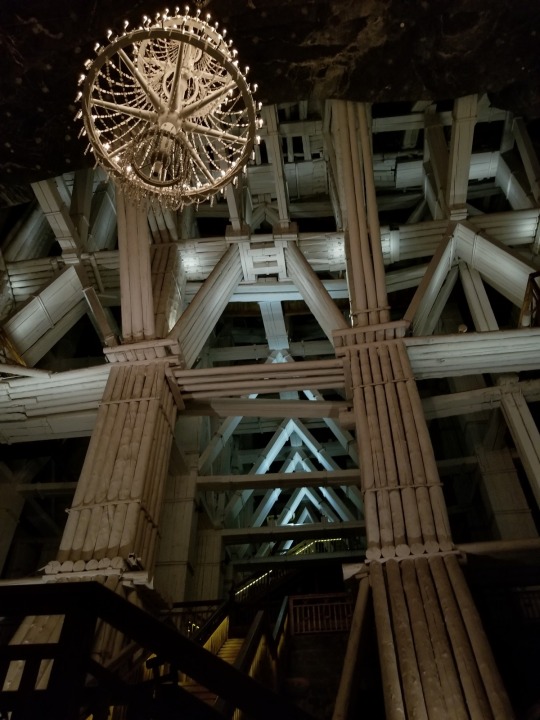
After an interesting hour or so touring the mines, it was time for us to queue up at the exit. The tour had taken us a further 71 meters underground, down to a depth of 40 stories. There was no way we were going to be climbing back up. Fortunately, there was an elevator. Unfortunately, the elevator wasn't especially big or especially fast. So we had to wait.
When it was finally our turn, I foolishly thought that our long day of walking was nearing its end. But it wasn't. The walk from the exit queue to the elevator proved comically long. It felt almost as long as the rest of the visit put together. Some of us started joking that the tour was just a ruse and that around the next corner would be a group of guards ready to escort us into our new lives as indentured miners.
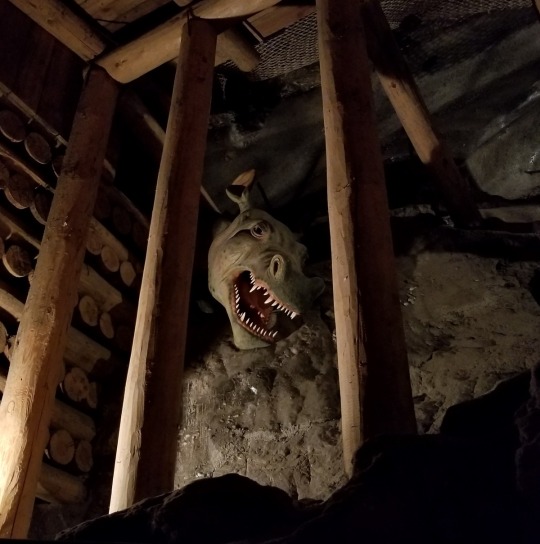
And then the dinosaur attacked. (Not really, that was earlier. Apparently there are several overlapping tour routes, and at one point we stumbled across part of the kids' tour.)
But eventually, one of the turns turned out to be the final turn, and the promised elevator bore us up into the setting sunlight--a quarter-mile walk away from the building we'd entered through.
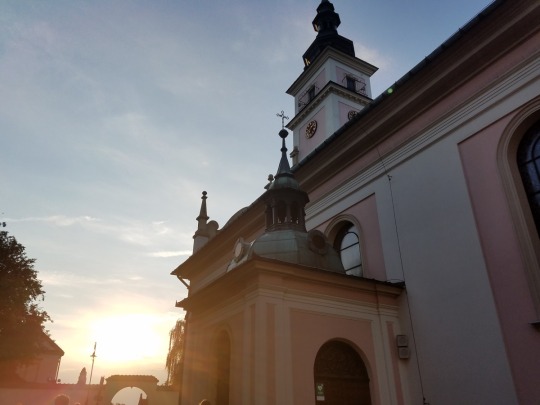

I’m glad we got to go to the salt mine. But if I had to pick one mine in all of Europe to visit, it would still be Llechwedd slate mine in Wales. The Wieliczka salt mine tour was heavy on wowing visuals but light on actual information about the miners themselves, which was what made the Welsh mine tour so impactful for us.
On the ride back into town, we passed right by the flat we were renting. As tired and footsore as we were, we each anticipated the 15-minute walk back from the tour office in the muggy evening air with dread. As if on cue, however, the driver pulled over to drop another group off at a nearby hotel. Jessica and I hopped out with them and gratefully strolled the half-block back to our flat. We threw some frozen pizzas in the oven and watched Disney's The Princess and the Frog, which I'd never seen before.
The next morning, as we left our flat to spend our last day in Krakow, I stopped to take a picture of a construction sign that had been amusing me since we first arrived.
Before I go on, let me admit upfront that this says a lot more about me and my ignorance than it does about the Polish language or anything else. Throughout our trip, we've seen a lot of signs in a lot of languages. And for the most part, they all fell into one of two categories. Either I could at least sort of understand them based on context and linguistic similarity or they were completely unintelligible.

But with Polish signs, my first reaction is not "I understand this" or "I don't understand this," but rather, "Am I drunk right now?"
Anyway, our first stop of the day was a sober-yet-uplifting continuation of yesterday's themes: Krakow's Jewish neighborhood of Kazimierz.

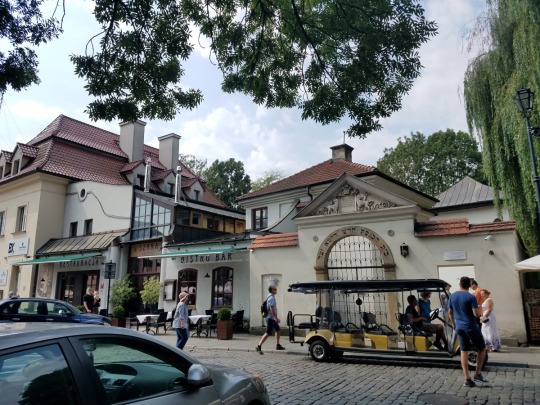
The neighborhood--originally a separate walled town--was named for 14th-century Polish king Kazimierz the Great. It was Kazimierz who first opened up Poland as a haven for the Jews being oppressed throughout Europe (and whose likeness we'd seen enshrined in salt the day before). Poland's Jewish population didn't exactly have an easy time of things over the centuries that followed, but they were at least usually relatively safe.
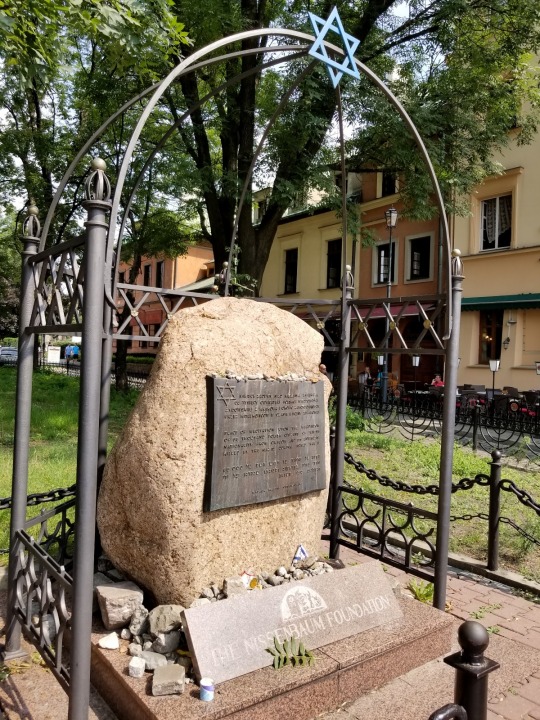
In the center of Kazimierz's Broad Street ("Ulica Szeroka"), a monument honors the 65 thousand Jewish Cracovians who were murdered by the Nazis.

We visited the Remu'h Synagogue, which houses Krakow's Old Jewish Cemetery. (As a man, I was asked to wear a yarmulke while I on the premises, and I happily obliged.)
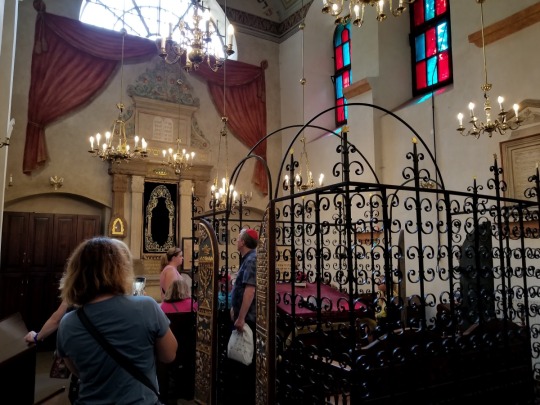
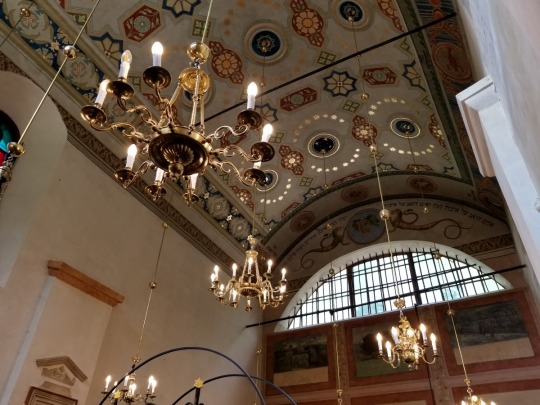
We were mainly interested in the cemetery, but we visited the synagogue first. It was remarkable. The Synagogue dates back to 1553, and it has been beautifully maintained and restored. You can even still see the original 16th-century frescoes adorning the upper walls.
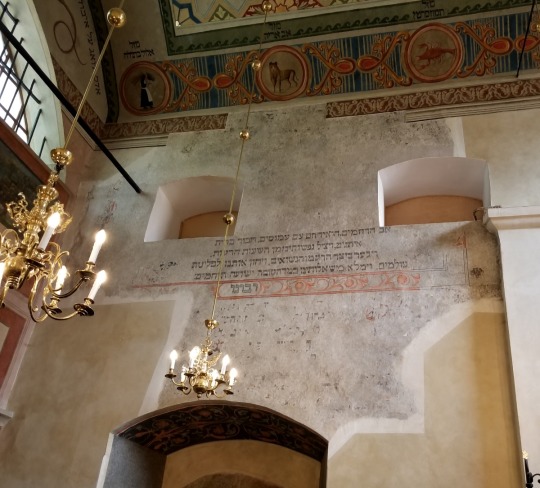
Thanks to our guidebook, we also learned a bit about traditional synagogue design. Like Christian basilicas and Islamic mosques, synagogues face east toward Jerusalem. At the front of the synagogue is the ark, where the scrolls of the Torah are stored. In Orthodox synagogues like this one, the speaker stands in an ornate cage in the middle of synagogue, facing east along with the congregation. (In Reformed synagogues, the speaker stands in the front and faces the congregation.)
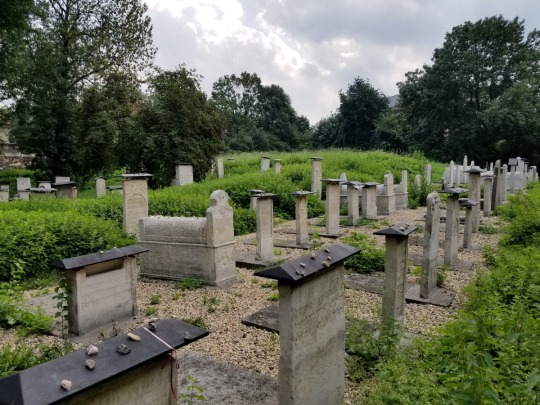

Outside, we learned about Jewish cemeteries, too. (Or at least the ones in Eastern Europe.) Unlike the neat rows of Christian cemeteries, the Jewish graves have a somewhat more organic organizational aesthetic. (This would be much more evident at the Old Jewish Cemetery in Prague.) Most of the headstones were covered in small stones, which visitors place as a token of respect. We couldn't read the headstones, but some were clearly more notable by the mountain of stones placed on and around them.
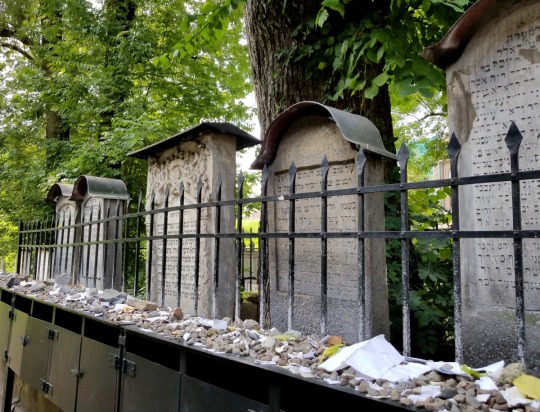
Near the synagogue still stands the gravestone of Moses Isserles, the 16th-century rabbi who founded it.

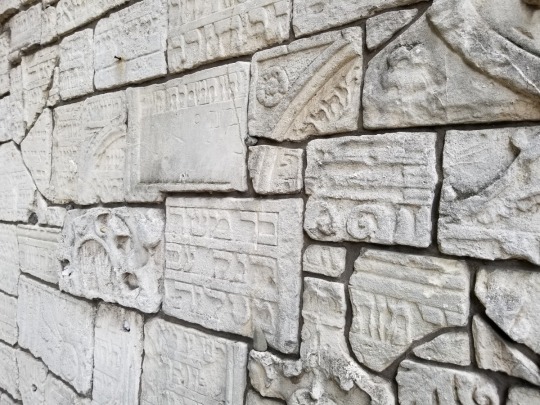
For us, though, the most striking feature of the cemetery is also one of its newest--the walls. During the Nazi occupation, many of the Jewish graves were desecrated and smashed. After WWII, the caretakers did their best to restore the cemetery as much as possible. And as a memorial of the Nazi atrocities, they used the unsalvageable fragments of smashed headstones to line the cemetery walls.
Stepping back onto Broad Street, we found the place increasingly lively with visitors. Many were Jewish Americans, but there were plenty of diverse groups from around the world. This is the "uplifting" part of the "sober-yet-uplifting" thing I said earlier. For all the effort that the Nazis did to erase other cultures from the world, it was the Nazis who got erased. The Poles and the Jews are still right here where they've always been.
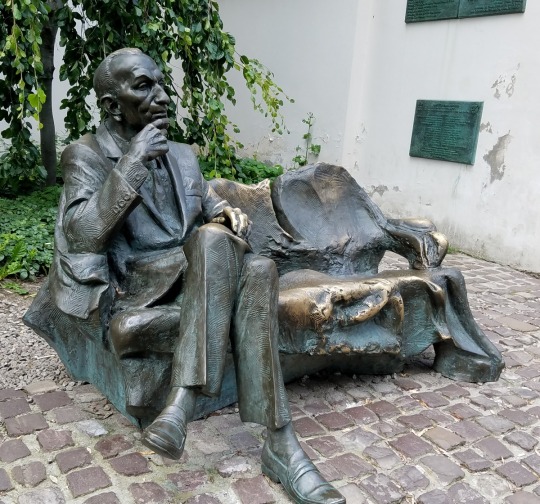
Near the Remu'h Synagogue is a bronze statue of a kindly looking man sitting contemplatively on a bench. The man is Jan Karski, a Catholic Pole and one of the first people to publicly speak out against the Nazi extermination camps--a charge so unimaginably heinous that the rest of the world didn't want to listen.
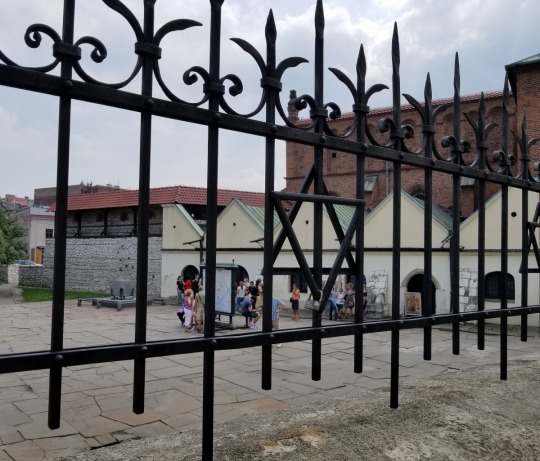
At the bottom of Broad Street stands the 14th-century Old Synagogue, the oldest Jewish building in Poland. It and the surrounding courtyard are conspicuously sunken below street level. It was built this way on purpose because medieval laws forbade Jewish buildings from standing taller than Christian buildings. So in order to make it as big as they wanted, the Jewish architects had to build down as well as up.
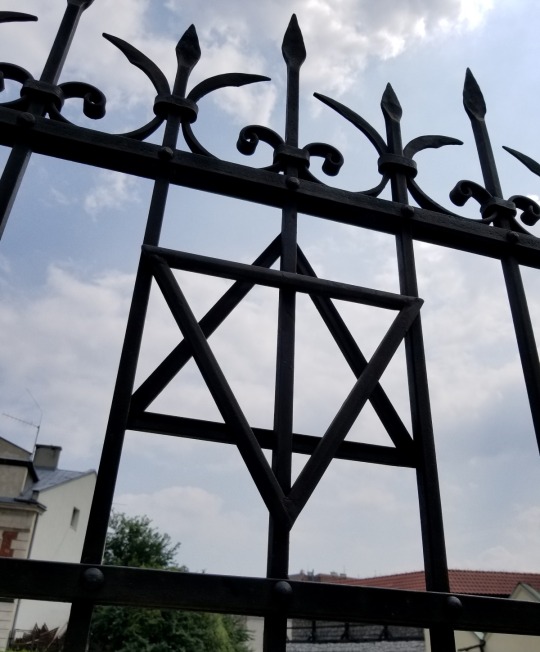
As fascinating as Kazimierz is, and as much as we no doubt would have enjoyed visiting inside the Old Synagogue and visiting all the other historic neighborhood sites, we had other things we wanted to get to on our last day in Krakow. So we bid farewell to the charming Jewish neighborhood and headed back north toward Wawel Castle.
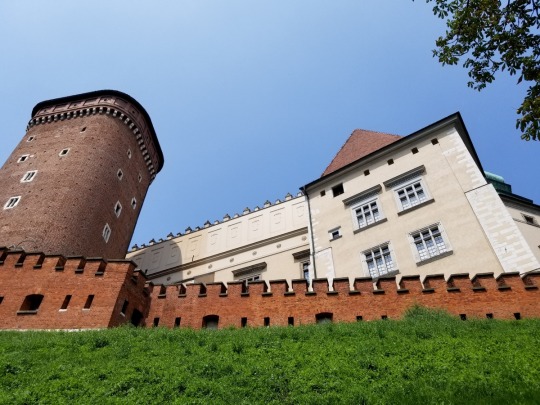

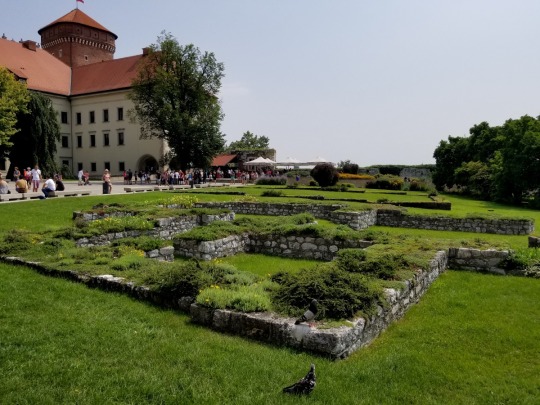
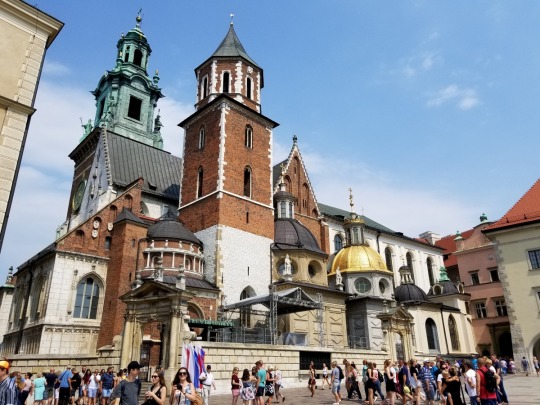
The castle is huge and beautiful. Again, we didn't have the time or energy to justify buying a ticket to go inside, but there was plenty to see just wandering around the grounds, which were open to the public. Including the massive, Florence-inspired central courtyard.
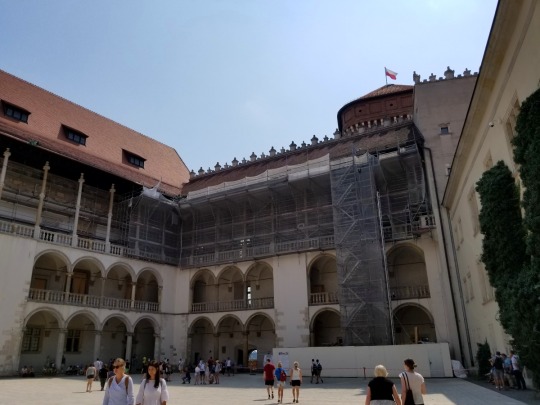
Like the Palatine in Rome, Wawel Castle is built on top of a hill where an ancient Polish tribe is said to have lived. And as with the wolf-raised twin founders of Rome, Krakow has its own deliciously outlandish origin story. According to the legend, a fiendish dragon set up shop in a cave at the base of Wawel hill. The dragon demanded a weekly tribute of cattle, and if an offering was not made, the dragon would feast on the tribespeople instead.
The dragon was finally defeated by a clever cobbler, who fed the dragon a lamb stuffed with explosive sulphur. The dragon devoured the tainted lamb and was overcome with a thirst so great that he dove into the nearby Vistula and drank until he exploded.
King Krakus, the mythical founder of Krakow, was so impressed by the cobbler's ruse that he let the boy marry the princess and become the next king.
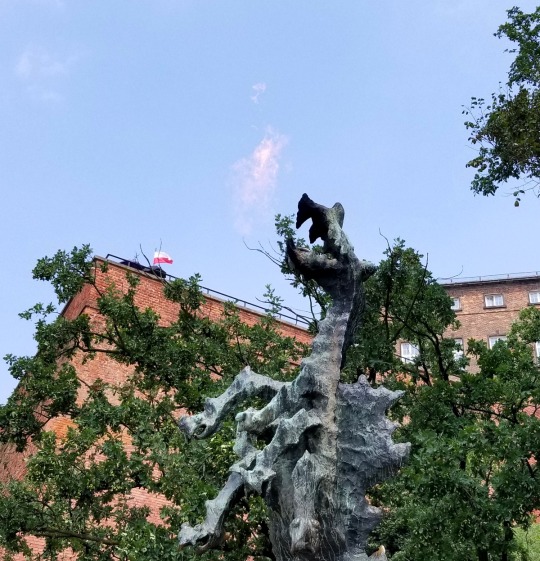
Today, a seven-headed metal dragon at the base of Wawel Hill spews a gout of flame every five minutes or so.
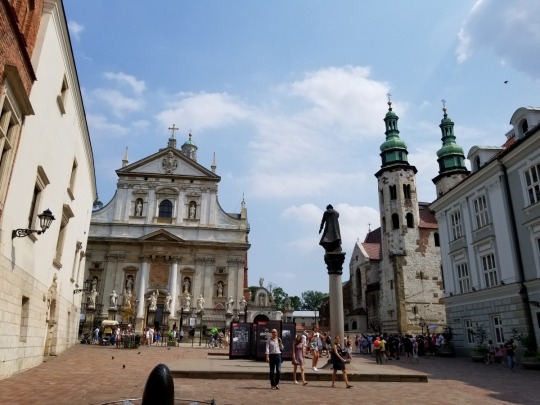

Leaving the castle behind us, we wandered back up to Market Square, where we had an early dinner at one of the touristy open-air restaurants. We're pretty sure it was actually the same Italian restaurant that Jessica ate at on her last night in Krakow eight years ago.
Given the prime tourist-trap location, I expected it to be a bit of a frivolous splurge--a celebration of our having successfully survived our first stop in Eastern Europe. But it turned out to be a thoroughly enjoyable and surprisingly affordable meal. In that way, at least, Krakow's Market Square is very much unlike the Italian cities it was built to emulate.
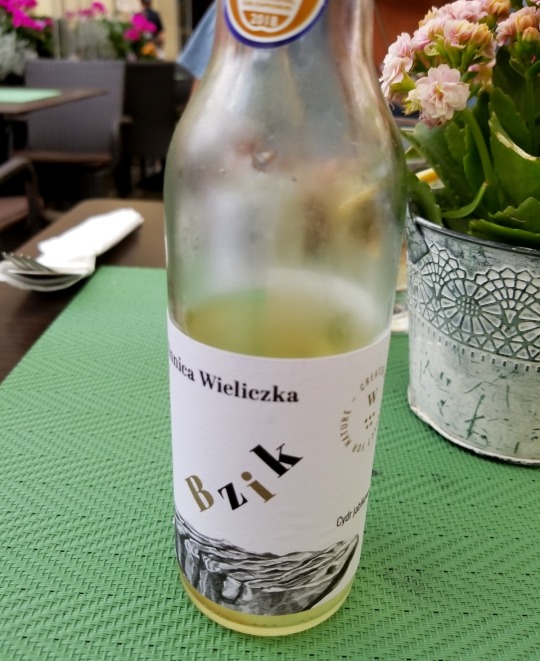
And we enjoyed a local Polish cider. A bit tart, as I recall, but not at all bad.
We headed back to our flat, but our day was far from over. We wouldn't be staying at our flat this night. We wouldn't be staying in any flat this night.
We would be taking the night train to Prague.
Next Post: The Night Train to Prague
Last Post: Auschwitz
3 notes
·
View notes
Text
For anyone who wants to learn more about Judaism! Also, kind of a post about how to deal with some Things and Stuff. This is a long post so I’ll put it under a read more for those interested:
This is really for an anonymous message I got that described struggles with things that I think many of us struggle with or have in the past: not being “Jewish enough” in the eyes of other Jews due to your heritage being on the “wrong” side (read; on your father’s side), yet still experiencing antisemitism from goyim. Not learning very much, if anything, about Judaism as a child but wanting to learn more as an adult. Not being comfortable with some traditions or laws of Judaism because you are a) a feminist b) LGBT c) an atheist. Living in a place with few to no Jewish spaces. Not feeling welcome in the Jewish community due to any or all of these things.
Book recs!
If you’re the kind of person who enjoys reading (or can at least tolerate it) I highly recommend these books! They’re all books that I have either read/started reading/or plan on reading. (Please keep in mind that none of these are Jewish texts such as the Torah or the Talmud and that I do understand the importance of such religious texts but am not recommending them because I feel those are obvious sources of information)
A Bride for One Night if you aren’t familiar with the Talmud, it’s a collection of writings and explanations of Jewish laws and traditions and it’s old as balls. The author of this book, Ruth Calderon, takes a bunch of Talmudic stories and makes them into these wonderful beautiful stories that are easier to read than the original ones from the 3rd and 6th centuries. Even if you don’t know anything about the Talmud this book is so fascinating and fun to read.
The G-d Who Hates Lies is literally perfect for you if you have issues with how women are viewed and treated in the most traditional sense of Judaism. It’s a really great criticism by people who are extremely qualified to make those criticisms (both are rabbi’s and I think they both have doctorates in theology, specifically Modern Orthodox Judaism, which makes for a really cool viewpoint). I can’t find anything about the third author of this book, who is a woman, but it’s comforting to know that a woman had a part in this as well. Obviously these people love Judaism, they just want to see it adapt to modernity. Just in general it’s a really thoughtful book that challenges dogma.
Jewish Literacy was recommended by an anon (thank you!) The rest of the title is “The Most Important Things to Know about The Jewish Religion, Its People and Its History” so like. Ya get what ya see here folks. HOWEVER I did see a review that mentions there is some Islamophobia and hostility towards Jews who are antizionist. It does genuinely look informative and I haven’t read it myself so I can’t attune to whether or not that review is accurate, but maybe be cautious if you read this in knowing that the author may not be objective.
Book of Mercy made me openly weep and feel something tender and weird in my heart and like. Okay so it’s not informative so much as it’s a book of poetry by Leonard Cohen (he was Jewish if you didn’t know!) He calls his poems “modern psalms” and honestly this would be a good read even if you aren’t religious at all because his writing is just so gorgeous. But it does have references to Judaism and his identity as a Jew
Understanding Judaism is really a “building blocks” kind of book to me, if that makes sense? It’s really informative but also really basic and is fantastic for people who know very little about Judaism or just want a well presented understanding of the core aspects of the Jewish religion. Even if you aren’t a Jew who’s looking to learn or someone who is considering conversion it’s still a good book if you’re interested in world religions regardless of your faith or lack thereof. (man I’m starting to sound pretentious lmao I just mean like, if you’re an atheist or Catholic or whatever, it’s pretty interesting and also this guy is kinda dorky-funny so it makes for an easier read than some other books about religion)
Shmooze I think this is meant to be more for a group to read an discuss, and like, also maybe meant for a younger audience (I’m talking about teenagers so not really that young, but if you’ve been reading dull infodumps by 90 y/o Jewish rabbis with doctorate degrees this is gonna be a change of pace lmao) I should mention that I’ve only read like two pages of this book because I saw it at Barnes and Noble and just kinda briefly checked it out so I don’t know a ton about it but it stuck in my head and the reviews look positive so
Obvious I don’t think you have to read all of those because I haven’t even read all of those so maybe just check one of them out if it seems like it could be helpful to you.
Judaism here on tumblr dot com:
Okay so like. This is really my personal diced onion so take it however you will but keep in mind that this really only reflects things I’ve come across and how I feel.
Obviously there are a lot of really great blogs about Judaism but I don’t have any specific ones to recommend I’m sorry :O I really really hate ~Discourse~ and like, in-depth arguments about the Holocaust because I get so wrapped up in it and let’s be honest, tumblr is all about the discourse and ignorance. That being said, I like to follow other people who are Jewish and blog about whatever because that usually leads to safer discussions and also is a great way to find really helpful thoughts and discussions by other Jews about topics like being LGBT, being a woman, being an atheist, etc. These are just nice to read and also if you aren’t familiar with certain Yiddish or Hebrew terms that are commonly used it’s a good way to see how and when they’re used in certain contexts.
I’m going to tag anything like this that I post here as “good info” just so me and anyone who wants can find this stuff easier. No they won’t necessarily have anything to do with hockey.
Also please be very careful when you’re reading a post that is presenting certain things as facts, always double check what someone is saying because misinformation is spread so quickly, and it’s almost always unintentional. The things that I find genuinely helpful/safe/fun involve opinions, common feelings and experiences, little personal stories and jokes, cool stuff like that.
I’m Jewish on my father’s side :0
Me too boo. Unfortunately that’s an unending discussion, and one that is often held by matrilineal Jews and doesn’t actually include patrilineal Jews, nor does it consider our thoughts/feelings/experiences. Without sounding like an idiot, it is absolutely buckwild to me that there are people who have been raised Jewish, have never known anything other than Jewish tradition, have been subject to antisemitism, but still aren’t considered Jewish.
And then this is where I see matrilineal Jews who hold this viewpoint bring up Reform Judaism, which is one of the three main branches of Judaism and does recognize patrilineall Jews as Jews. I’ve seen some discrepancy as to whether or not patrilineal Jews had to have been raised Jewish in order to be considered Jewish. This is all well and good for Jews like me whose family practices Reform Judaism, but for patrilineal Jews who wish to practice in an Orthodox or Conservative synagogue, it gets tricky.
Basically, yes this is a huge topic that inspires a lot of disagreement, and that sucks, but here’s what it comes down to. No one else is allowed to make you feel inferior because of your heritage. So many people, even modern Orthodox Jews, recognize that certain aspects of Judaism need to adapt to today’s society. I don’t want to offend anyone here, but I really do feel that most matrilineal Jews who don’t consider us Jewish are extremely hypocritical (for a lot of reasons but mostly like...y’all really follow every aspect of Jewish Law? Like do you really? All of it? Girl do u? Or are you maybe just being elitist). Learning about your heritage, talking about shared experiences, combating antisemitism, these are all things that are fair game for you (especially for the anon who said they were atheist) and going to Shabbat services, praying, participating in holy days. That’s all yours if you want it, bubbeleh.
Can I be an atheist Jew?
Sure you can! I, personally, am not an atheist so I wasn’t comfortable finding specific resources about this because I don’t really know much about it? It’s fine with me if you’re atheist that’s none of my business, I just don’t want to direct you to a bad source. But yes, many Jews are atheist, many are secular, I’m sure there are many here on tumblr. It’s absolutely okay, Judaism is an ethnoreligion, and while you may experience Judaism different than the rest of us, you’re still a Jew and still belong.
Here’s an excerpt from a short lil synopsis of Judaism:
These three connotations of Judaism as a monotheistic system, as a literary tradition, and as a historical culture are sometimes viewed separately. For example, there are Jews who see themselves as culturally Jewish, but who are also non-religious or atheist, often identifying more strongly with Jewish “peoplehood” than with traditional understandings of God and Torah. Even so, all Jews would recognize that these three points of reference have shaped and guided Jewish experience through the ages.
Jewish “peoplehood” that they talk about is like. Culture, customs, food, art, history, etc.
One last little note on this, you’ll hear a lot that Judaism focuses more on actions than on beliefs. This is an excellent article that is pretty short and worth reading that I want to include because I think that even if you don’t believe in G-d or even if you are seriously questioning, the focus on just. Doing good. Actively doing good things and trying to be a good person (I know that’s objective but bear with me) is a such a huge part of Judaism that you can try to incorporate into your life without having to subscribe to any sort of dogma or beliefs that you don’t hold. “Judaism is certainly a faith-based tradition. Belief in G-d is central to our religion. It just isn’t a prerequisite. If you are Jewish, you are so regardless of belief.”
But I’m a feminist....
As you should be. This is probably another personal statement you gon’ wanna take with a grain of salt, but I think Judaism, especially in the last 50 years or so, has made huge strides in this. Especially Reform Judaism, but that kind of goes without saying.
Example, my synagogue was founded as a Conservative synagogue. Our website still says we are. I’m not actually sure tbqh, like I said, my family are Reform Jews, and so are most other families in our congregation I think but this is literally the only synagoge for like hundreds of miles so. Anyways our rabbi is female (Rabbi Shaina!) and she does great work, we all love her. She’s really adament on teaching kids that gender shouldn’t keep you from anything, that Judaism is for all Jews, that it should enhance our lives. She wears a tallis, lays her tefillin, and reads from the Torah.
My point here is that while this isn’t like, the end of misogyny in Judaism as we know it, it’s still a big deal in most religions to have a woman as their religious leader, essentially a position of religious power. For men to accept a woman as a religious leader is not something that is super common in most religions. And we’re like, a tiny congregation over a hundred miles away from anyone else, technically a Conservative synagogue, that’s super loving and accepting of a feminist running our shit... female rabbis are super common and I think it speaks a lot to how we’re progressing as a religion. Reform Judaism is going to be your best bet when it comes to tolerance but knowing that all three of the main branches are progressing, at least with this, is really comforting to me.
However, that’s an extremely one sided view and doesn’t really show the issue as a whole. This super short article (? not sure) is a bit pessimistic in my mind but presents the other side of things and gives a good explanation of the traditional sources of misogyny in Judaism, so this could further your understanding as well.
By no means are we perfect but we’re workin on it. Look into Jewish Feminism though, if you have the time. That article is just a lil intro to the topic.
I’m Q*eer/LGBT and I’m not sure y’all are gonna be cool with that...
Well this one’s a doozy.
I’ll kick this right off by presenting an article that is objective and does not reflect the author’s opinion, just lays out the issues at hand. It also has some links to other good pieces, including one cool story about a transgender man, Rafi Daugherty, embracing his role as a father and details his experience with pregnancy and giving birth. I should mention that I am cisgender so I’m interpreting this article through a different point of view, but it really does make a point of celebrating Rafi and his daughter and sharing their story. It does include a little cultural background context, but this is a positive story that I think deserves to be shared :)
Then there’s this statement from the Religious Action Center of Reform Judaism that confirms its absolute acceptance and support of LGBT Jews.
On the other side of things, there are still homophobic and intolerant Jews. Conversion camps were not just a Christian thing, there were Jewish conversion camps as well, which is horrific. Idk what to say because I think homophobia and transphobia in Judaism is really similar to what you would find in Christian settings.
I’m bisexual and I feel completely welcomed by other Jews who know this about me, and I certainly don’t feel any less Jewish because of it.
I live in a place where Jewish spaces are rare.
I really hate to disappoint with this one but I don’t have any specific sources or anything like that. Alls I got to say is that’s why the internet is so great? I really don’t feel like that’s helpful at all, but I think for the most part, the Jewish side of tumblr is pretty accepting and welcoming. Obviously that’s not always gonna be true though idkdjaskfl;dj
I spose with this one I wanna encourage anyone who has any good resources for involvement or something like that to reply to this post or drop by my inbox and let me know! Or maybe just your thoughts on some Jewish spaces you’ve encountered?
I hope this was helpful
In conclusion, don’t let anyone make you feel less Jewish. Your sexual identity, gender identity, and even your belief in G-d doesn’t take away from your Jewishness. I’d like to say that since I started delving into Judaism a little more I’ve found a lot of peace. And yeah that sounds cliche and also vague but it’s really a breath of fresh air to learn about my family and know more about this community. Also if you’re comfortable with or willing to try prayer, even if you’re atheist, it can be a good way to decompress sometimes, a really therapeutic kind of way to voice your thoughts and feelings and reflect on them.
There’s so much information and culture to delve into but it’s so so worth it to learn and I’m really happy for you that you’re interested in getting more in touch with your Jewish roots.
If any of these links don’t work and you’d like to see them let me know!
30 notes
·
View notes
Text
Uchideshi at Integral Dojo, in the city of Tel Aviv, Israel, Middle East. Month 1 of 2 / May-June 2018
I think it’s time to write again.
If any of you have been visiting this blog/site from time-to-time to see if I’d posted, and seen that I had not, I’m sorry about that. A lot has been happening and up until the last few days, I’ve had fairly low-energy and have been sort of exhausted, or at least fairly worn out, most of the time, In fact, I haven’t really felt that good for the most part the last couple of weeks. There’s a shift happening though in my time here for the better, and I’m starting to feel it again. And so, I thought I’d use this new energy and spirit to return to the internet and write my time here.
Being an “uchi deshi”, which like I said last time is a Japanese term for “ inside student,” or “live-in student,” is hard. The following is written about it on the website for the place I am living and studying in and through my time here.
“As an uchi deshi you are making a greater commitment to a developmental life through Aikido and related practices, in a full time, total emersion environment. This residential apprenticeship program is designed to develop your Aikido and deepen your understanding of the art.”
“If you think you are ready to immerse yourself in the art of Integral Aikido and walk the path of practice, embodiment, and meditation, then you are welcome to apply to our uchi deshi program, and come to train and live with us in the Integral Dojo, in Tel-Aviv.”
It is basically 2x a day classes 6 days a week, with one class only on Friday the exception, and no class on Saturdays. It’s hard. Sometimes it’s been amazing and focused and other times I’ve felt like resting or reading a book or taking a break. And to be straight, he has been open to me missing a class if something comes up or I need it, as long as I’m also communicating about it. There’s also the ongoing maintenance and cleaning of the dojo, somethings daily and others weekly. Like I said, it’s not easy. That being said, it is very, very much worth it. I still know I am exactly where I want to be right now in life.
Part of that has to do with the last few days and meeting some people and a local community space, that has group dinners and workshops and yoga classes and music events. And its not far from where I live, maybe 10-15 minute walk from here. I want to know some of the people more, I really like some of them. I’ve really liked the people I practice/train with here at dojo too, but I haven’t really spent time with them outside of that environment. These people are also committed to well-being, connection, and embodying a sort of humanistic and even loving intention (to try and use a few terms that might describe the sort of ethos or spirit of the people I seem to connect to most in a depth-way). And they’re almost all Israeli. And, on of them is a Scot.
That was fucking brilliant. I’ll write more about that later, but I met a guy from Glasgow, 35 and living here in Israel for a few years, a Jew but most definitely Scottish. I wasn’t expected that. I’m still trying to figure out how making it to the UK is going to work and what will happen there. It was sort of synchronicitious (word? of a synchronicistic quality) to meet a Scottish person here. And he’s a climber. And does yoga, too. And after a night learned about “Pele”, the community space and learning how to become a volunteer which I think I’ll do for the rest of my time here, I found out he used to do Aikido too. We’re exchanged contact information and he said when/if I make it to Scotland, I can stay with his “mum” (as they say in that part of the world) for dinner if want a place to go. I think we’ll be meeting up again soon... I’ve always wanted to know a Scot, and I’m looks like that is happening which is really something.
Okay, this isn’t going to be as uber-long as the last one. The frequency of these writings seem to not be happening as much as I thought, but I want to try and keep to the lengths. I know people are interested in following this, but I also want to make it work with people’s limited time, not against it. And so I’m going to take a minute to sit here in front of my laptop, close my eyes, breathe... and be with the where I’m at and how the last month has been here. Then I’m going to open them, and like I did last post/entry, start writing out some images and moments of the last 4 weeks in this city and what I’ve seen and experienced here. And then I’ll finish it off, and you can all go back to living your lives. Which, I hope, is going alright, wherever you are and whatever it is your experiencing. All of it.
Okay. I’ll start with what just happened, as it does about if not everyday in the mornings, and go from there:
A man yelling outside my window coming from the garage body shop down below, which seems to be happen at exactly 9am throughout the week, who’s words are still unintelligible to me. Something like “bira shratav hestratif! Behema destrev asafif!” Again, not that but maybe close to it. Its muffled and not that clear, but I can’t make out any Hebrew words I know. If anything it sounds more Arabic. Who knows.
Walking down through the neighborhoods of Montefiore, the area of Tel Aviv I live in here. Loud and noisy filled streets or honking and buses are not too far away to one side, the main Ayalon highway (route 20) a few streets to the other side, but here it’s relatively quiet and nice. Residential apartment buildings alongside with auto body shops, mechanic garages, an office building or two, an AM:PM (the 24 hr convenience store here, sort of like Israel’s 7-11 or C-Stop), a music store, synagogue, and some other corner stores, cafes, and food places.
Bus Stop at HaChashmonaim, Hamesger, and Derech Manachem Begin, always different people, a diversity I only somewhat expected to see here:
- Middle-eastern-looking young men of different build more often than not very fit and athletic looking, in T-shirts and jeans around my age, maybe sunglasses, very short hair maybe some facial hair, usually not a lot of it. Also more “white” looking men, that is more “Ashkenazik,” or Jews of European, as opposed to those more middle-eastern “tsefardi” or “yemenite” in background.
- Israeli women of all heights and ages, seemingly from my own, (20s) all the way through 30s and 40s, less commonly older, in anything from professional business clothes to light dresses to jeans and blouses and t shirts as well. And its hard not to walk the streets of Tel Aviv for more than a few minutes and not see an attractive woman somewhere around you.
- Occasionally a religious Jew, either wearing ordinary clothes with a kippa, maybe tzit tzit, and sometimes too dressed fully in black and white as is often the way of the very orthodox here and elsewhere in the world.
- To put it descriptively, “black people.” That’s the term an American would use, because that is who they most resemble from our own culture and country. That is, both men and women, usually young or middle-aged, who look very much of African descent because, well, they are. Though they are a wide range of black people here, from all different countries of origins and appearances too. Some are Ethiopian Jews who came here for refuge, though because I’m close to south Tel Aviv, which is very much an immigrant area, many came for jobs as migrant workers from places in Africa such as Eritrea, Somalia, and other places. Apparently their are some tensions with this minority and the the majority of the population of Israelis there.
- Bicycles, with any of the previous demographics, riding by all the time.
- And motor-scooters, too. So many damn motor-scooters. It’s very characteristic of Tel Aviv, I’ve seen. They’re everywhere. Its a little ridiculous. More so are the little scooters people ride around on everywhere, where upright handles and all, on the sidewalks. They’re like as common here as long boards in California.
All of those types of people could be seen at the closest bus stop 5 minute walk from the dojo where I live, where the main streets of Hamesger and HaChashmonaim and Derech Menachem Begin all converge in one place, a hub of sorts.
There’s so much else I could write, but it’d take hours. Pages and pages of descriptions, let alone if I want to write reflections on it. I can tell you about the night I walked down Meir Diezengoff street, full of its well-known Tel Aviv night life of cafes and bars and stores open until really late, maybe 2, 3am.
It was like 9, 10pm and I walked alone passed countless restaurants and food places packed with young Israeli’s crowded at outdoor tables watching the world cup and eating and drinking together, and then looking over and seeing a homeless man laying with his head away from people on the pavement behind a bus stop with a box in front of him for money. I remember looking at this and stopping myself to see it and feel it, because I realized that although I noticed and it did effect me, there was a thought of acknowledgement and empathy but not deeply felt compassion... which is what I think people like that need most... not the ignoring and not looking that most people do to have it not ruin their night out, but still not where I know I to be and exist from in this world.
I recall looking at him asleep there, and this beautiful girl walked by with a friend, and buses flew past, and the air had cooled off because it was evening and was full of activity and sound of people having a time, and there I was walking alone, so much where I wanted to be doing in my life, but also with a “hole in my soul” to quote that song, which I hope and believe soon will be finally taken care of as well. As I walked on I saw two religious Jews next to each other on a bench, intensely conversing, while girls overly dressed up to go partying walk by in tall heels, and others, others, so much stimulus, so much humanity, so much dichotomy of both the lively and exciting and sad and painful and for me, freedom and as some know its occasional companion, loneliness.. is there too.
All part of this existence on earth, now in the 21st century, as people in this world. It’s not all good. So much of it is, and I’m experiencing that more and more. And here in Tel Aviv, this urban center in the middle of the opposite side of the planet from home in the United States, I’m developing myself to really be able to sustainable and with centeredness and well-being navigate it all, right now and when I return home, into and through the future.
To finish off I’ll say this, somewhat in reference to my comment in the last paragraph; if things happen the way I hope, not only will I be cultivating the abilities I am here with being an Uchideshi of centeredness, focused mind, open and relaxed but alert body, and embodied awareness and intent, but also find someone and people to open my heart again. That’s the one thing that’s missing from this picture, and there are possibilities there. I sense it happening soon. Maybe. Possibly. For sure maybe.
Hope you all are having an okay time back home. My parents reminded me recently its the 4th next week there. I hope you find a way to not just have a great time but develop in someway, even work on as some of the language is the Sensei’s words here, “evolve”. The idea of really working with life, and conflict, our experiences good and bad and neutral, and ourselves.. and developing into better and better humans, both for our own well being and longevity, but for that of all people in our lives and the the ones we continuously encounter throughout our days and weeks through time.
Final note: I am immeasurably grateful and appreciate to have the opportunity to do this trip and experience what I am here. I am from time-to-time aware, as I focus on the intensity of my training and self-development, that most of the people in this world will never have an opportunity to do something like this, even if they really wanted to and it could be really something for them and their life, too. It’s either because of time, or money, or both. I think of all the people I pass on the streets, everyone going to work, here and back home. I think of people from all classes back in the States, both the 40 year old working class parents who work two jobs just to pay the rent, or the more middle-class and affluent ones like my own parents and background, who might live more comfortably but only at the cost of non-stop working, frequent stress, and not a lot of time for themselves. I think of all the people pursuing advance degrees and further education, from people my peers, millennial in and finishing graduate school, in academics or in trade schools trying to secure financial security and a reliable future.
I from the soldiers my own age on the streets everywhere here, in uniform and looked very much like ordinary kids- kids, listen to me. They’re younger than me, that’s clear. They’re very much not kids though. 18, 19, maybe 20. They’re my sister’s age, and very much young adults. They are committed to this duty, and some of them might never live to be my age and live the rest of their lives. Most will. There are no wars happening here, only ongoing tension and conflict on and off. Still.. I thought of this as I passed a cafe with a few eating together yesterday not far from here.
All of this again makes me so fucking appreciate to be here. To be focusing on my being. So much of it is really honing my consciousness, making my my body supple, flexible, and even powerful, and the idea is in this process, create a form that is me that can handle anything, throughout the rest of my life. It’ll be an ongoing process endlessly, of knowing myself and who I am, and the world and other people, but this existential effort... to know oneself, and hone oneself too... it’s all about being more “on point”, as I and others sometimes call it.
This and hopefully soon more fully opening my heart to the vast array of emotions and human feelings that are possible that even now are still not really a part of my experience of life... it’s like that overused mission statement used these days, from the Y to other business and non-profits and education and medicine, somewhat cliche but based in truth so its actually valuable “for the body, mind, and spirit”.
If body is our physical form and its external strength and flexibility as well as internal processes and wellness, and mind is cognition and emotion, identity and personal history/memory/life story, as well as thought... I think “spirit”, or maybe “soul”, is that “somethingness” that holds it all together. It’s the ethos and life-force, the sort of half consciousness, half heart, that love and truth and connection come from, both our awareness of ourselves, and that which we base our ethics, and therefore our choices, on each moment of our lives.
The reflection I’ll leave you with is this; I’m not in graduate school, and I’m not working. I have 2 jobs back home, but no career. And yet, I have a vision. I really believe now that if you strive to optimize and enhance your being, your spirit/body/mind connection of who you are, things can and likely will fall into place. To be both fully in life, and in yourself, integrated and focused and open and with intent, is to be really alive and in touch with things. From there, each conversation is valuable, each time you’re with someone it has meaning, and each breath is “life-spirit” entering your lungs and blood and running through you with all the molecules of energy and sustenance from the environment and earth itself.
Alright, I’m really finishing now. Breath. It’s so important. Breath. Breathe. Inhale, exhale. “Life-spirit” might be a poetic term I just came up with in writing, but there is more truth to it that most realize. It is the difference between going through your days, and really living. Being. It nourishes your internal organs, and opens your body, if done right and full as often as possible. It can clear the mind and help navigate emotional states and feelings of all kind. It can return us to center.
It is the only link between the mind and body that is both voluntarily, and involuntarily controlled. It is the foundation of meditation practices, though you never to meditate to know its truth. If you can’t having a sitting practice or do yoga, or even if you do, make life your meditation.
Breathe. It’s the link. When you, I, we, are with it... we’re really there. Here.
Josh Berson, alonaryk.
1 note
·
View note
Text
I'm less than a month away from my 28th birthday, and right now what I keep thinking about, the thing that brings me the greatest happiness and peace in this dreadful year is that I love and am loved, and more than that I am certain in those things. And like, none of that is romantic, it's all family and friends, and there's a part of me that sometimes stresses about that, but in this moment I just keep having moments when I pause and am just struck by how much I love my dear people, and the certainty of how much they love me, and I feel so so so lucky.
This got long so uh, let's do a readmore. I'm just sort of gushing about friends and family under the cut, don't mind me.
It's been a really hard year - I haven't had an unmasked interaction with anyone but my roommate in more than a year, I've never gone this long without seeing my family, I've never gone this long without going to synagogue, I've never had this little human interaction in my life, just like almost everyone. But even when everything feels hard and overwhelming, even when I am hit over and over with things like the death toll, I am also constantly reminded that I am loved, and I have a kind of confidence and surety in that fact that I don't think I possessed, say, a decade ago, when I was 17 almost 18. But there is something to be said for settling with age, for having friendships that have lasted for years and years, for the realization that my friends and family think about me even when they can't see me, that even when we can't be in the same place we still love each other. I see a dumb joke and send it to my brother, he sees a cute picture and sends it to me, friends see goofy lotr posts and share them, my mother sends pictures of herself and my dad with their friends from the before times, my aunt and uncle send hamentaschen (admittedly theirs are terrible, but they love me!), roomie's aunt sends a goofy card addressed to both roomie and me and my grandmother sends us four face masks and is sure to label the ones that are for roomie and jokes that she knew if she didn't label them I'd steal them all. My grandfather sends his spare copy of my dad's college yearbook for reasons that are known only to himself and my dad and I giggle about it on the phone.
I'm not eligible for the vaccine yet, but a bunch of my dearest people are, my grandparents are almost all fully vaccinated (and almost all in their 80s so when I say I'm relived it's hard to express just how incredibly relieved I am), my parents are eligible and trying to get appointments. I love these people, I love my friends, I am struck every day by how lucky I am to have the roommate I do, by how lucky we are to be each other, to have found each other in college and to have formed the friendship we have, how very very very glad I am that we're quarantining together, that neither of us was alone, and honestly that neither of us was with anyone else because we're better suited to doing this with each other than with our respective parents, much as we love and miss them. On saturday I'm going to attend virtual torah study, and it will be good, and I will have community, and my friends will still love me and I will still love them, and my family will still love me and I will still love them. And even though I can't see anyone but roomie I feel so lucky, so blessed, so glad to be exactly who I am, and to know all of these people.
0 notes
Text
G I A N T . C H A R A C T E R . S U R V E Y
[ tagged by ]: @eloquated
[ tagging ]: @eyerevived @dcmonblooded @remembcr and everyone else who wants to
G E N E R A L
[ name ]: Raphael Ortiz Santiago
[ nicknames ]: Rafa (only by certain people he’s close to)
[ birthday ]: June 19
[ birthplace ]: Zacatecas, Mexico
[ age ]: 84 (looks like 19)
[ eye color ]: Dark brown, almost black
[ height ]: 1.75m / 5′7 feet
[ weight ]: Fairly muscled
[ nationality ]: Mexican
[ astrological sign ]: Gemini
[ location ]: Hotel Dumort
[ siblings ]: four brothers and one sister, all deceased
[ pets ]: None
[ in the morning i’m ]: Sleeping
[ all i need is ]: the Clan
[ love is ]: Apparently, a good thing
[ i’m afraid of ]: Loved ones dying
[ i dream about ]: Not much, unless nightmares are counted too
H A V E . Y O U . E V E R ?
[ pictured your crush naked? ]: No?
[ used someone? ]: Yes
[ been used? ]: Yes
[ been cheated on? ]: No
[ considered cheating? ]: No
[ been kissed? ]: Yes
[ done something you regret? ]: Of course
F A V O R I T E
[ food? ]: Can’t eat anything anymore, so does it matter?
[ fruit? ]: It used to be cherries
[ candy? ]: I don’t have one
[ color? ]: Red
[ number? ]: 3
[ animal? ]: Cats
[ drink? ]: Blood, obviously
[ soda? ]: I preferred coca cola
[ book? ]: Macbeth or Julius Caesar
[ room? ]: Bedroom
[ movie? ]: I don’t have a favorite
D O . Y O U ?
[ have a boyfriend/girlfriend? ]: No
[ like cleaning? ]: No
[ have a tattoo? ]: No, though I admit they can be nice
[ have any piercings? ]: No
[ cheat on tests/homework? ]: I don’t remember, probably not
[ drink/smoke? ]: Sometimes, with Magnus or Lily
[ swear a lot? ]: Probably more than I should
[ like watching sunrises or sunset? ]: I wish I could
[ pray? ]: Of course
[ go to church? ]: Not anymore, although I used to go every week
[ have secrets? ]: Naturally
[ have a best friend? ]: Lily and Eliot (and Jack @eyerevived )
[ like your own handwriting? ]: Sure
A R E . Y O U ?
[ obsessive? ]: About certain subjects, I suppose
[ excited? ]: Not particularly
[ bored? ]: At the moment, yes
[ happy? ]: Not really
[ missing someone? ]: Yes
[ confused? ]: No
[ tired? ]: No
[ mad? ]: At certain people, yes
[ sleepy? ]: No
D O . Y O U . E V E R ?
[ wait around just to talk to someone? ]: Sure
[ write about those ‘special’ moments? ]: No, I don’t need a diary to remember
[ wish you were a member of the opposite sex? ]: No
W H O . W A S . T H E . L A S T . P E R S O N . W H O ?
[ you talked to? ]: Lily and Eliot
[ you hugged? ]: Magnus
[ you kissed? ]: That’s unimportant
[ sent you a letter? ]: The Los Angeles clan leader
[ you sent a letter to? ]: The Los Angeles clan leader, in return
[ you laughed with? ]: Eliot
[ slept in your bed? ]: Myself
[ you shared a drink with? ]: Lily or Eliot
[ you went to the movies with? ]: A group of the Clan, a few years ago
[ yelled at you? ]: Camille
[ you called? ]: Magnus
[ you kicked? ]: A Shadowhunter
[ you saw? ]: Lily
W H O . I S ?
[ the most handsome person you know? ]: Objectively, probably Magnus? Although, Isabelle Lightwood is also beautiful.
[ the weirdest person you know? ]: Simon Lewis, without a doubt the most confusing person I currently know
[ the funniest person you know? ]: Eliot
[ the loudest person you know? ]: Loud in volume is Lily, loud in character is Magnus
[ the quietest person you know? ]: Aurélie, a clan member
[ the sweetest person you know? ]: Johannes, another clan member
[ the most serious person you know? ]: Every person from the Clave
[ your best friend? ]: Well, that used to be Ragnor
[ the person you hate the most? ]: Valentine Morgenstern
[ the person you see most? ]: Lily and Eliot
[ your soul-mate? ]: Soul-mates don’t exist.
W H A T . I S ?
[ the first thing you thought of when you woke up? ]: Everything that needed to be done tonight
[ the song that best describes you? ]: I don’t know
[ your best feature? ]: Physical or in general?
[ your most treasured memory? ]: Any of the ones with my hermanos
I N . T H E . F U T U R E
[ what is the age you hope to get married? ]: I’m not going to be married
[ number and names of kids? ]: I won’t have any
[ where do you see yourself at age twenty? ]: I’ve surpassed twenty by a few decennia now
[ describe your dream wedding? ]: I already said I won’t have one, so it doesn’t matter
[ when and how do you want to die? ]: Preferably a long time from now and quickly
[ what are your career plans? ]: Keep leading the clan
[ some place you’d like to visit? ]: I would like to go back to Zacatecas.
L A S T . T I M E
[ last time you went out of state? ]: Clan business a few months ago
[ last time you were outside? ]: Yesterday night
[ last time you had a snowball fight? ]: Years ago
[ last time you were listening to music? ]: A while ago
O T H E R
[ how many people would you say are good friends of yours? ]: Three
[ what hurts the most, physical or emotional pain? ]: Emotional.
[ have you felt this recently? ]: Yes
[ what do you wear to bed? ]: Sweatpants and a t-shirt
[ when’s the last time you slept with a stuffed animal? ]: As a child
[ have you ever used a ouija board? ]: No
[ how many rings before you pick up the phone? ]: As soon as I can find it
1 note
·
View note
Link
Hello

Hope your week has been a good one and if your child/ren have gone back to school, the emotions on all sides haven’t been too overwhelming. It could take a few weeks for routines to settle so I’ll still be praying for you all.
This week we are looking at Acts Chapter 13:1-12, the start of Saul being referred to as Paul and his journey as an evangelist with Barnabas.

This week’s video for ages 3-7
This week’s video for ages 7-11
Game
What would you pack? If you were going on a trip to a different country to tell others about Jesus, what would you take? See if you can go through each letter of the alphabet and come up with something pack! E.g A= Adapter for the different plug sockets! B=Bible C= Charger D=Dictionary for the language of that country E= Ear plugs to help me sleep if it’s a noisy place!
Can you get something for every letter?
In the passage we are looking at today, Saul, who starts to use his Roman name Paul more, and Barnabas start their journeys going to different places to tell others about Jesus. Do you think they packed the same things as you?

Bible Bit
Here is the passage from the International Children’s Bible:
Acts Chapter 13:1-12
Barnabas and Saul Are Chosen
‘In the church at Antioch there were these prophets and teachers: Barnabas, Simeon (also called Niger), Lucius (from the city of Cyrene), Manaen (who had grown up with Herod, the ruler) and Saul. 2 They were all worshiping the Lord and giving up eating. The Holy Spirit said to them, “Give Barnabas and Saul to me to do a special work. I have chosen them for it.”
3 So they gave up eating and prayed. They laid their hands on Barnabas and Saul and sent them out.
Barnabas and Saul in Cyprus
4 Barnabas and Saul were sent out by the Holy Spirit. They went to the city of Seleucia. From there they sailed to the island of Cyprus. 5 When they came to Salamis, they preached the Good News of God in the Jewish synagogues. John Mark was with them to help.
6 They went across the whole island to Paphos. In Paphos they met a Jew who was a magician. His name was Bar-Jesus. He was a false prophet, 7 who always stayed close to Sergius Paulus, the governor. Sergius Paulus was a smart man. He asked Barnabas and Saul to come to him, because he wanted to hear the message of God. 8 But Elymas, the magician (that is what his name means), was against them. He tried to stop the governor from believing in Jesus. 9 But Saul was filled with the Holy Spirit. (Saul’s other name was Paul.) He looked straight at Elymas 10 and said, “You son of the devil! You are an enemy of everything that is right! You are full of evil tricks and lies. You are always trying to change the Lord’s truths into lies! 11 Now the Lord will touch you, and you will be blind. For a time you will not be able to see anything—not even the light from the sun.”
Then everything became dark for Elymas. He walked around, trying to find someone to lead him by the hand. 12 When the governor saw this, he believed. He was amazed at the teaching about the Lord.’
Videos
I searched for quite a while to try and find a video for this passage and it was tough to find a good one! Obviously, feel free to see if you find one you like, but here is what I found…
This one from Saddleback Kids gives an overview of Saul and Barnabas’ story. It mentions Saul’s conversion and basically tells us that Barnabas and Saul were sent out as evangelists. It’s a good overview of their mission, but doesn’t mention the encounter with Bar-Jesus/Elymas or any other detail from this week’s passage:
These two are with puppets and have more of the detail of this week’s passage and covers the bit with Elymas
Part 1:
Part 2:
You might want to stop the video at 2:25 where it says ‘Pause the Video for Storyteller’, as this is where it stops for the bit we are looking at and jumps to Chapter 14 v8! (Spoiler alert…)
Age 3-7s: You’ll probably want to retell the story in your own way, explaining that Saul and Barnabas had just been to Jerusalem to take the gifts there and now had come back. You might want to explain what fasting means.
After retelling the story, consider asking the following:
Would you like to visit a new place or country?
God told Saul and Barnabas that He wanted them to go to different places to tell others about Jesus. Do you think they ever felt a bit nervous about going somewhere new?
What could they do if they felt afraid of the new job God had asked them to do? (Pray and remember God has said He will never leave us on our own.)
What would you like God to help you with this week? Maybe you want some help in being a good friend back at school. Ask Him

Age 7-11s: After reading together, or retelling ask:
Yep, what stands out? Any questions or thoughts?
What does fasting mean? (To stop doing something for a time to spend time with God. Eg, not eating, watching TV, playing video games. People fast so that they can focus more clearly on God with more dedication.)
Notice that through the prayer and fasting of the church, they hear the Holy Spirit tell them that God wants Saul and Barnabas to do a particular job. They pray and fast some more before Saul and Barnabas are sent out on their journey. Have you ever really wanted God to tell you something as clearly as we hear about here? Have you ever heard God or the Holy Spirit clearly? We can always ask to hear from God. Sometimes we might not be sure if what we’ve heard came from God or just from ourselves, but the Holy Spirit will only ever tell us things that keep us focused on Jesus and doing things that He would want. If you hear a voice saying ‘It’s ok to tell that lie because no one will find out.’, we know that’s definitely not the voice of the Holy Spirit. We should always test what we believe God might be saying to us by asking if it would follow His ways and truths.
Which verse tells us Saul’s other name? (9)
Read verses 6-12 again. What do we learn about Bar-Jesus? He was also called Elymas which means ‘magician’. (He was a Jew, he told lies about God, he didn’t want Saul and Barnabas to tell Sergius Paulus about Jesus or for him to believe, Saul filled with the Holy Spirit sees right through him and calls him the son of the devil, he goes blind.)
What do you think when you read those verses again?
Whenever we are doing God’s work and telling others about Jesus, there is always a chance that someone isn’t going to like it. The enemy is happy when people are living in darkness and don’t know Jesus as their saviour. Reading the passage today, Elymas did his best on behalf of the enemy to stop Sergius Paulus hearing and believing in Jesus. But. We see again, the power of the Holy Spirit giving Saul/Paul the words and courage to call him out and then God’s power in blinding him; enough for Sergius Paulus to see who is the most powerful and the truth of Jesus’ salvation.
In this passage Saul and Barnabas get a clear call to what job God wants them to do: go and tell others about Jesus. God has a job for each of us, and we should all do our best to tell those around us about Jesus but we won’t all be called to travel to do it. Have a think and pray about what job God wants you to do-how can you help with the work of helping others know about Jesus? We read how important being filled with the Holy Spirit is and this not only helped the church know that God wanted Saul and Barnabas to go to Cyprus, but also gave them the courage to tell others.
Crafts/Activities
Here’s a colouring sheet of Saul and Barnabus.
Print out (or draw your own) the map of the areas we are reading about. See if you can find the places named in the passage (Starting with Antioch in Syria) and draw a line to show the journey Saul and Barnabas made. Keep this map for future weeks as there a more places to add to next week!

Have a go at making the boat using the print out. (Instructions are here) You can use the men too, if you like and choose who is Saul and who is Barnabas and the others! Keep your boat for future journeys! It should look something like this, if you add some netting from a fruit bag:

How about a craft for your name? In the passage today, we hear lots of names and what they mean. Why not get creative and use whatever you can to make a plaque or name card for yourself? You could write what it means underneath or, if you have a nickname or something you’re know for, write that too! It could look like:


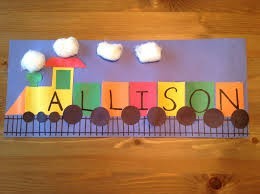
0 notes
Text
Evidence of the Babylonian conquest of Jerusalem found in Mount Zion excavation
https://sciencespies.com/biology/evidence-of-the-babylonian-conquest-of-jerusalem-found-in-mount-zion-excavation/
Evidence of the Babylonian conquest of Jerusalem found in Mount Zion excavation


Earring or tassle ornament made of gold and silver from the destruction layer of 587/586 BCE. Credit: Mt Zion Archaeological Expedition/Rafi Lewis
Researchers digging at the University of North Carolina at Charlotte’s ongoing archaeological excavation on Mount Zion in Jerusalem have announced a second significant discovery from the 2019 season—clear evidence of the Babylonian conquest of the city from 587/586 BCE.
The discovery is of a deposit including layers of ash, arrowheads dating from the period, as well as Iron Age potsherds, lamps and a significant piece of period jewelry—a gold and silver tassel or earring. There are also signs of a significant Iron Age structure in the associated area, but the building, beneath layers from later periods, has yet to be excavated.
The Mount Zion Archaeological Project, co-directed by UNC Charlotte professor of history Shimon Gibson, Rafi Lewis, a senior lecturer at Ashkelon Academic College and a fellow of Haifa University, and James Tabor, UNC Charlotte professor of religious studies, has been in operation for over a decade and has made numerous significant finds relating to the ancient city’s many historical periods, including the announcement made in July, 2019 on evidence concerning the sack of the city during the First Crusade. The current find is one of the oldest and perhaps the most prominent in its historical significance, as the Babylonian conquest of Jerusalem is a major moment in Jewish history.
The team believes that the newly-found deposit can be dated to the specific event of the conquest because of the unique mix of artifacts and materials found—pottery and lamps, side-by-side with evidence of the Babylonian siege represented by burnt wood and ashes, and a number of Scythian-type bronze and iron arrowheads which are typical of that period.
Because of the site’s location, various alternative explanations for the artifacts can be eliminated, the researchers argue. “We know where the ancient fortification line ran,” noted Gibson, “so we know we are within the city. We know that this is not some dumping area, but the south-western neighborhood of the Iron Age city—during the 8th century BCE the urban area extended from the “City of David” area to the south-east and as far as the Western Hill where we are digging.”
The ash deposits, similarly, are not conclusive evidence of the Babylonian attack in themselves, but are much more so in the context of other materials.
“For archaeologists, an ashen layer can mean a number of different things,” Gibson said. “It could be ashy deposits removed from ovens; or it could be localized burning of garbage. However, in this case, the combination of an ashy layer full of artifacts, mixed with arrowheads, and a very special ornament indicates some kind of devastation and destruction. Nobody abandons golden jewelry and nobody has arrowheads in their domestic refuse.”
“The arrowheads are known as ‘Scythian arrowheads’ and have been found at other archaeological conflict sites from the 7th and 6th centuries BCE. They are known at sites outside of Israel as well. They were fairly commonplace in this period and are known to be used by the Babylonian warriors. Together, this evidence points to the historical conquest of the city by Babylon because the only major destruction we have in Jerusalem for this period is the conquest of 587/586 BCE,” he said.
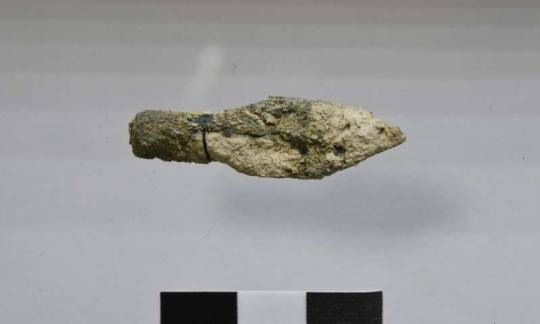
One of the Scythian type arrowheads found in the destruction layer from 587/586 BCE. Credit: Mt Zion Archaeological Expedition/Virginia Withers
The clay artifacts also help date the discovery. The lamps, Gibson notes, are the typical high-based pinched lamps of the period.
“It’s the kind of jumble that you would expect to find in a ruined household following a raid or battle,” Gibson said. “Household objects, lamps, broken bits from pottery which had been overturned and shattered… and arrowheads and a piece of jewelry which might have been lost and buried in the destruction.”
“Frankly, jewelry is a rare find at conflict sites, because this is exactly the sort of thing that attackers will loot and later melt down.”
“I like to think that we are excavating inside one of the ‘Great Man’s houses’ mentioned in the second book of Kings 25:9,” Gibson speculated. “This spot would have been at an ideal location, situated as it is close to the western summit of the city with a good view overlooking Solomon’s Temple and Mount Moriah to the north-east. We have high expectations of finding much more of the Iron Age city in future seasons of work. “
The building that is apparently part of the layer remains unexcavated. “One might ask why haven’t we excavated the whole building?” Gibson said. “The reason is that we are slowly taking the site down, level by level, period by period, and at the end of this last digging season two meters of domestic structures from later Byzantine and Roman periods have still to be dug above the Iron Age level below. We plan to get down to it in the 2020 season.”
The unexpected and rare piece of jewelry found is apparently a tassel or earring, with a bell-shaped gold upper part. Clasped beneath is a silver part made in the shape of a cluster of grapes. Gibson noted that this discovery of jewelry “is a unique find and it is a clear indication of the wealth of the inhabitants of the city at the time of the siege.” The only other discovery of jewelry in Jerusalem from this period was made many years ago in 1979 in an Iron Age tomb at Ketef Hinnom outside the city.
The researchers say that finding evidence of a critical historical event is what makes the discovery particularly exciting. Lewis, another co-director of the project, explained that “It is very exciting to be able to excavate the material signature of any given historical event, and even more so regarding an important historical event such as the Babylonian siege of Jerusalem.”
By all accounts the Babylonian conquest of the city by the Neo-Babylonian king Nebuchadnezzar was ferocious and resulted in a great loss of life, with the razing of the city and the burning of houses, and the plundering and dismantling of King Solomon’s Temple to God. The local ruler of the Kingdom of Judah, King Zedekiah, made an attempt to flee the city with his retinue, but was eventually caught and taken captive to Babylon.

One of the students of UNC Charlotte’s Levine Program, Miles Shen, holding in his hands a lamp dating from the Iron Age. Credit: Mt Zion Archaeological Expedition/James Tabor
The Hebrew Bible relates the famine and suffering that the inhabitants of Jerusalem suffered during the lengthy Babylonian siege of the city: “So the city was besieged unto the eleventh year of King Zedekiah. On the ninth day of the [fourth] month the famine was sore in the city, so that there was no bread for the people of the land. Then a breach was made in the city, and all the men of war [fled] by night by the way of the gate between the two walls…. And he [Nebuzaradan, the Babylonian captain of the guard] burnt the house of the Lord, and the King’s house; and all the houses of Jerusalem, even every great man’s house, burnt he with fire.” (2 Kings 25: 1-9).
The Babylonian siege of Jerusalem lasted for quite a while even though many of the inhabitants wanted to give up. “King Zedekiah simply was not willing to pay tribute to Nebuchadnezzar and the direct result of this was the destruction of the city and the Temple”, said Gibson.
Every year religious Jews in Jerusalem and across the world pray and fast in remembrance of the destruction of the Jewish Temple to God in Jerusalem, first by the Babylonians in 587/586 BCE, resulting in the exile of the inhabitants of the city to Babylon, and yet again in 70 CE at the hands of the Roman legions led by Titus. To remember the devastating destruction of the Temple, Jews gather in synagogues around the world and at the Western Wall plaza in Jerusalem, to pray and mourn on Tisha B’ Av (the ninth day in the Hebrew month of Av) according to the Jewish calendar, which falls this year on August 11th.
The Mount Zion archaeological project is directed by Shimon Gibson and James Tabor from the College of Liberal and Arts Studies at the University of North Carolina at Charlotte, in conjunction with Rafi Lewis of Ashkelon Academic College and Haifa University, and with sponsorship from Aron Levy, John Hoffmann, Cherylee and Ron Vanderham, and Patty and David Tyler and others, and facilitated by Sheila Bishop for The Foundation for Biblical Archaeology.
The dig is also staffed by a host of volunteers, including UNC Charlotte students. The project has been a favorite summer activity of for many of UNC Charlotte’s Levine Scholars Program, the university’s highly selective national program for undergraduate scholars.
“Participating in the Mount Zion dig has been an amazing opportunity for the Levine Scholars,” said Diane Zablotsky, director of UNC Charlotte’s Levine Scholars Program. “Although they are from different backgrounds and study in different majors, they shared a unique experience that left them with a deep appreciation of archaeology, the history of Jerusalem, and broadened worldview.”
The site is within the “Sovev Homot” park administered by the Israel Nature and Parks Authority. Other substantial remains of the multi-period ancient city were uncovered during the 2019 season, including vaulted basements from the time of Herod the Great, a Byzantine street which was the south-westerly continuation of the main city street known as the Cardo Maximus, and a sunken defense ditch that ran in front of the fortifications which greeted the Crusader’s when they attacked Jerusalem in 1099 and hindered their assault on the city.
The complex architectural sequence of superimposed structures dating back 3000 years or so is being carefully mapped by a team of recorders and draftsmen headed by Steve Patterson. The University of North Carolina at Charlotte has been conducting archaeological excavations in Jerusalem since 2006 and much vital historical and archaeological information has been steadily extracted from the digging operations.
Explore further
Archaeological evidence verifies long-doubted medieval accounts of First Crusade
Provided by
University of North Carolina at Charlotte
Citation:
Evidence of the Babylonian conquest of Jerusalem found in Mount Zion excavation (2019, August 11)
retrieved 11 August 2019
from https://phys.org/news/2019-08-evidence-babylonian-conquest-jerusalem-mount.html
This document is subject to copyright. Apart from any fair dealing for the purpose of private study or research, no
part may be reproduced without the written permission. The content is provided for information purposes only.
#Biology
0 notes
Text
Why Most Jews Aren't Bothered by the Times' Anti-Semitic Cartoon The ethnic-ethics divide.
Why aren't most American Jews troubled by the Times' cartoon? Why were all American Jews horrified by the anti-Semitic shootings at the California synagogue this past weekend, while most barely had their feathers ruffled by the anti-Semitic cartoon in one of the most influential media in America?
May 2, 2019, Dennis Prager
Last week, The New York Times published a cartoon so anti-Semitic that Bret Stephens wrote in his Times column that it was "an image that, in another age, might have been published in the pages of Der Sturmer." Der Sturmer was the Nazis' major anti-Semitic newspaper.
A Times columnist charging the Times with publishing a Nazi-like cartoon is quite a moment in American publishing history.
For those who haven't seen the cartoon, here is Stephens' description:
"The Jew in the form of a dog. The small but wily Jew leading the dumb and trusting American. The hated Trump being Judaized with a skullcap. The nominal servant acting as the true master. The cartoon checked so many anti-Semitic boxes that the only thing missing was a dollar sign."
The dog leading Trump had the face of Benjamin Netanyahu and was wearing a Star of David necklace. Trump was wearing a back yarmulke.
For those naifs and Israel-haters who dismiss such depictions as merely "anti-Zionist" or "anti-Israel" but not anti-Semitic, the yarmulke on Trump's head should be the giveaway, as should the theme itself — the Jew leading the Gentile astray, one of the oldest anti-Semitic canards.

Of course, the cartoon is not just about Israel or Jews. It is about Trump, whom the left so hates. It depicts him as the stooge of both Vladimir Putin and Netanyahu. There is no truth to either depiction, but if truth mattered to the left, there would be no left. Truth is a liberal value, and it is a conservative value, but it is not a leftist value. Truth to the left is pravda. Pravda, the Russian word for "truth," was also the name of the Soviet Communist Party newspaper.
So, the question is: Why would The New York Times, published in the city where more Jews live than any other city in the world outside of Israel, whose publisher is a Jew and whose editors are disproportionately Jewish, publish a Nazi-like anti-Semitic cartoon?
Here is Stephens' answer:
"For some Times readers — or, as often, former readers — the answer is clear: The Times has a longstanding Jewish problem, dating back to World War II, when it mostly buried news about the Holocaust, and continuing into the present day in the form of intensely adversarial coverage of Israel. The criticism goes double when it comes to the editorial pages, whose overall approach toward the Jewish state tends to range, with some notable exceptions, from tut-tutting disappointment to thunderous condemnation.
"For these readers, the cartoon would have come like the slip of the tongue that reveals the deeper institutional prejudice. What was long suspected is, at last, revealed."
Stephens continues:
"How have even the most blatant expressions of anti-Semitism become almost undetectable to editors who think it's part of their job to stand up to bigotry?
"The reason is the almost torrential criticism of Israel and the mainstreaming of anti-Zionism, including by this paper, which has become so common that people have been desensitized to its inherent bigotry. So long as anti-Semitic arguments or images are framed, however speciously, as commentary about Israel, there will be a tendency to view them as a form of political opinion, not ethnic prejudice. But as I noted in a Sunday Review essay in February, anti-Zionism is all but indistinguishable from anti-Semitism in practice and often in intent, however much progressives try to deny this."
Exactly right. As I wrote in "Why the Jews? The Reason for Anti-Semitism" 40 years before Stephens wrote his column, there is no difference between anti-Zionism and anti-Semitism. Of course, one can criticize Israel, just as one can criticize any country, but that is not anti-Zionism. Anti-Zionism is not criticism of Israel. It is a hatred of Israel — a hatred greater than that of any other country and a delegitimization of Zionism, the movement to reestablish the Jewish national home. Imagine someone who argued that the establishment of the Italian state — Italy — was illegitimate and who hated Italy more than any other country in the world yet claimed that he was in no way anti-Italian, as he had Italian friends and loved Italian culture. No one would believe such an absurdity.
Why aren't most American Jews troubled by the Times' cartoon? Why were all American Jews horrified by the anti-Semitic shootings at the California synagogue this past weekend, while most barely had their feathers ruffled by the anti-Semitic cartoon in one of the most influential media in America?
The answer is most American Jews, while ethnically Jewish, are ethically leftist. And ethics trump ethnicity — as they should. For most American Jews, therefore, the Times is far more consonant with their ethical values than are Jewish values (if, by Jewish values, we are talking about the Torah and traditional Jewish religious/moral teachings). So, then, when you combine hatred of the right-wing prime minister of Israel and reverence for the left-wing Times, even a Nazi-like cartoon — if it negatively depicts Benjamin Netanyahu and Donald Trump and is published in The New York Times — is no big deal.
0 notes